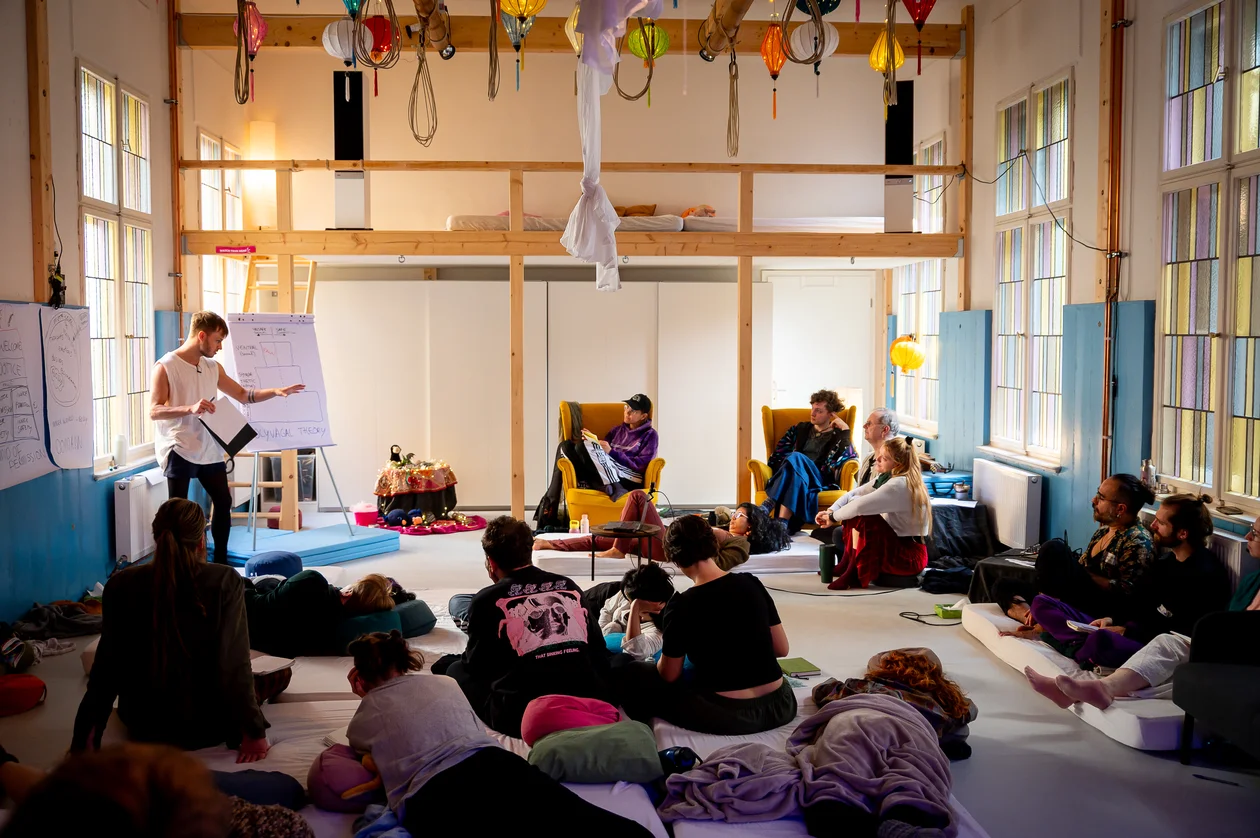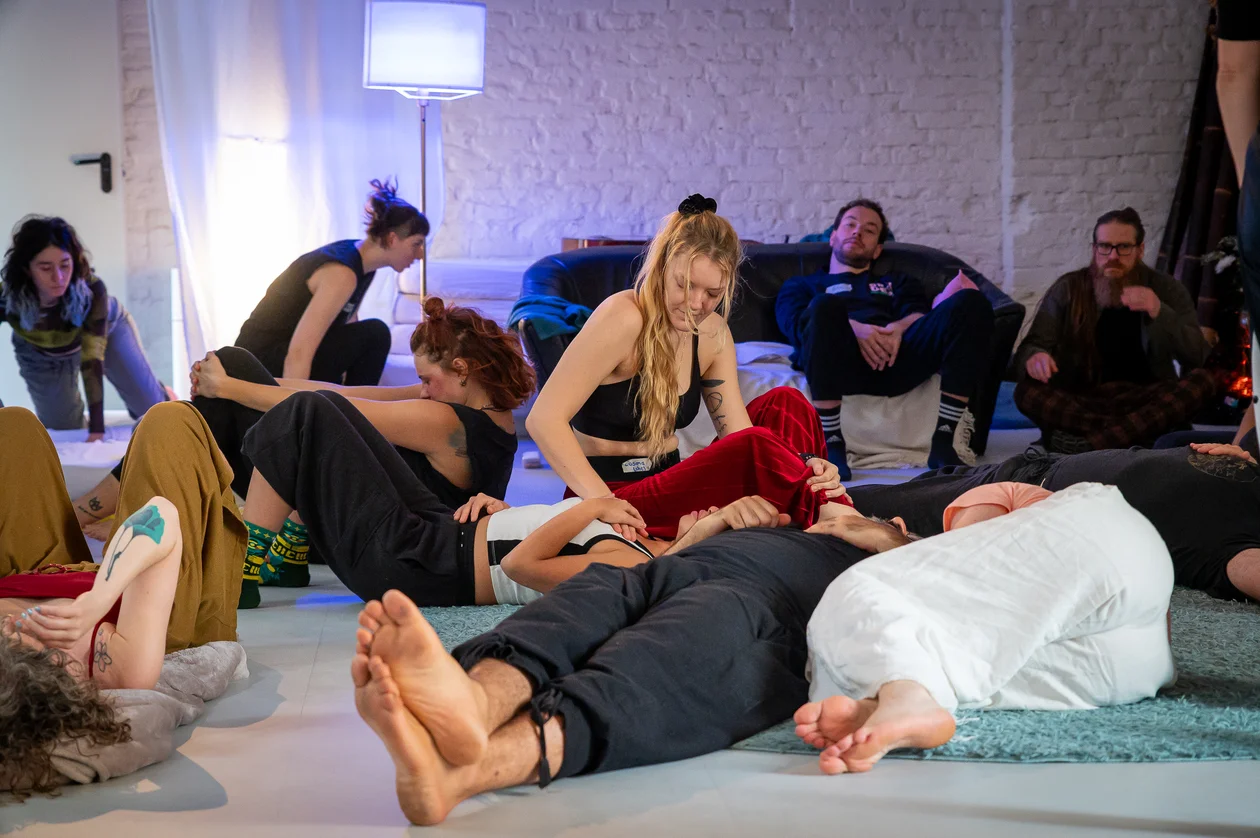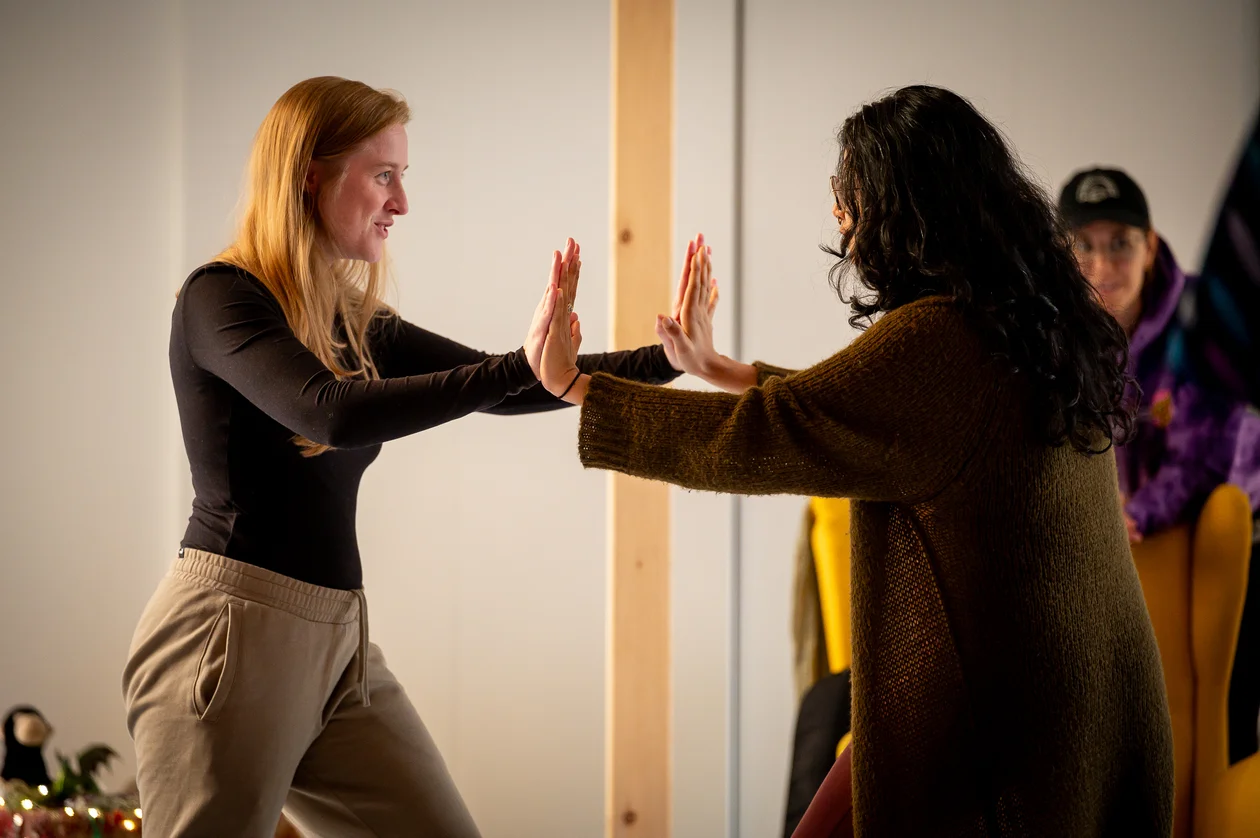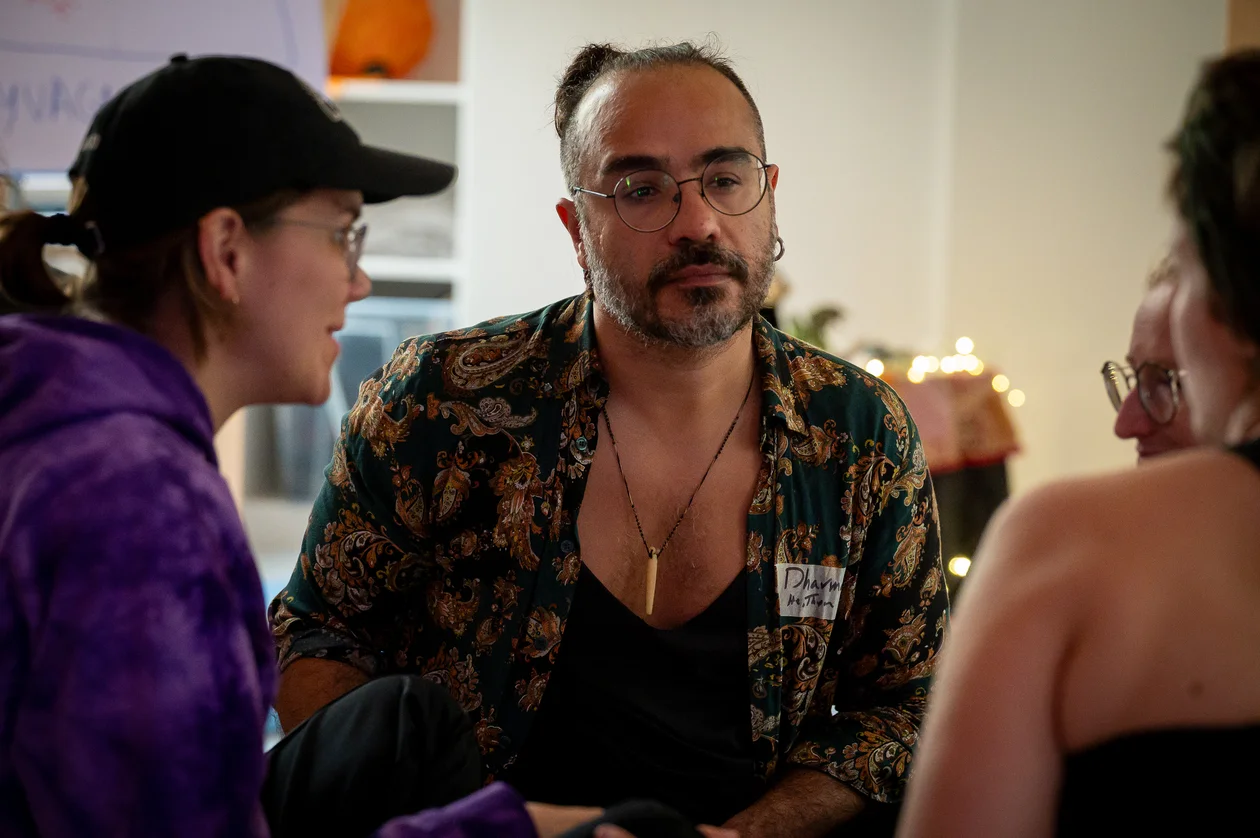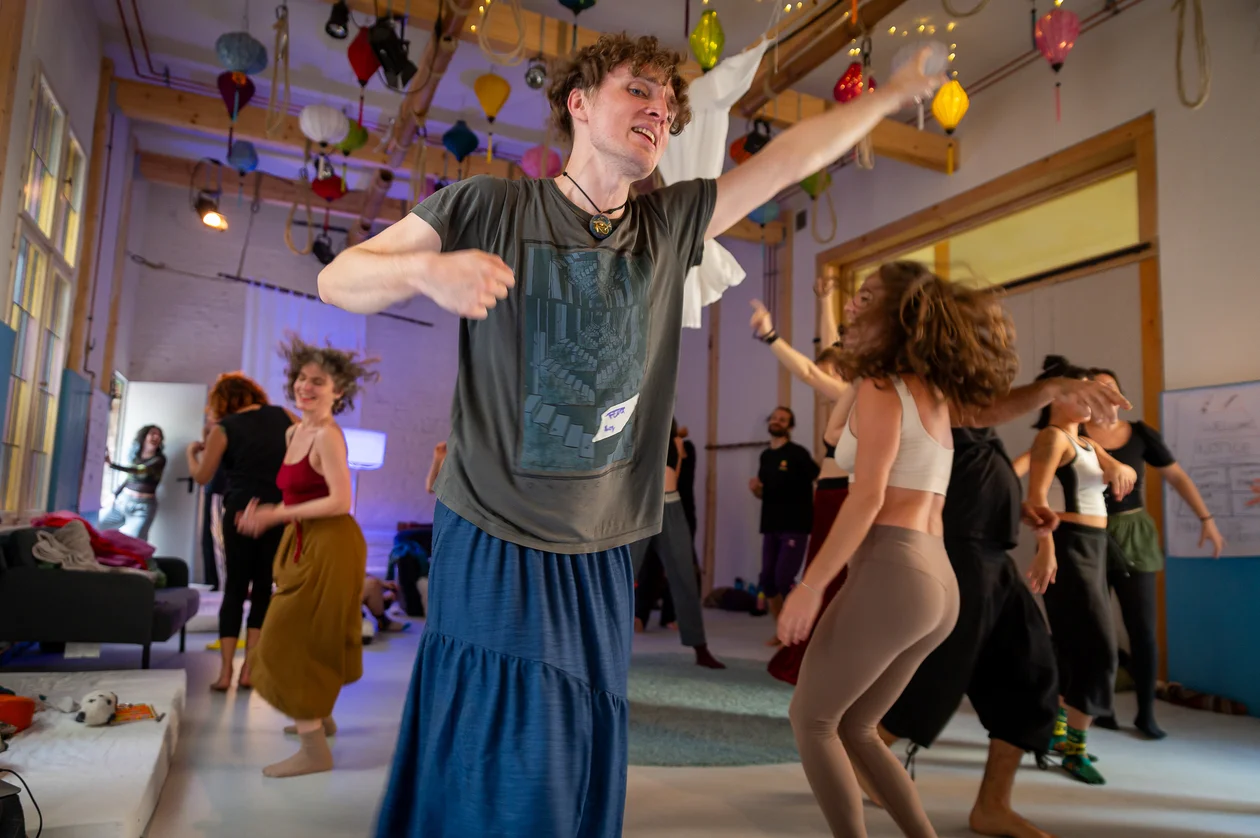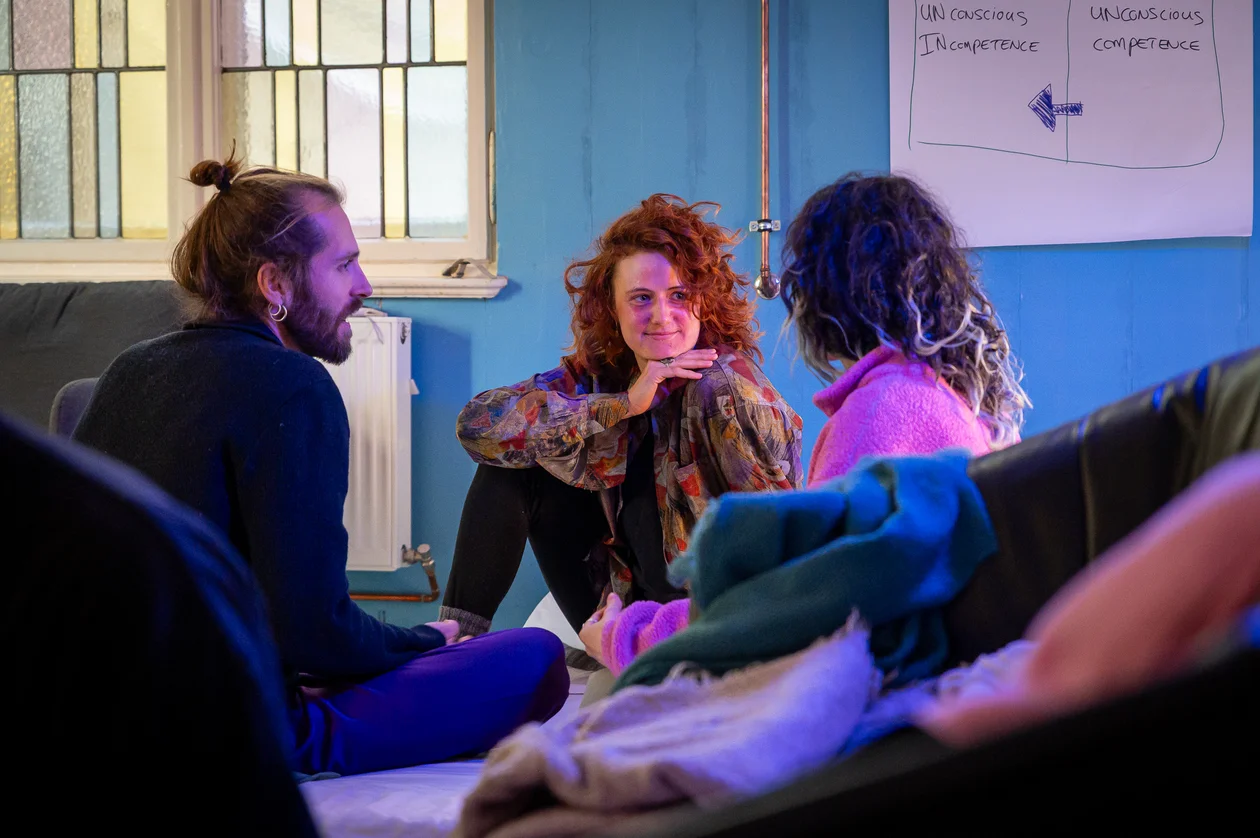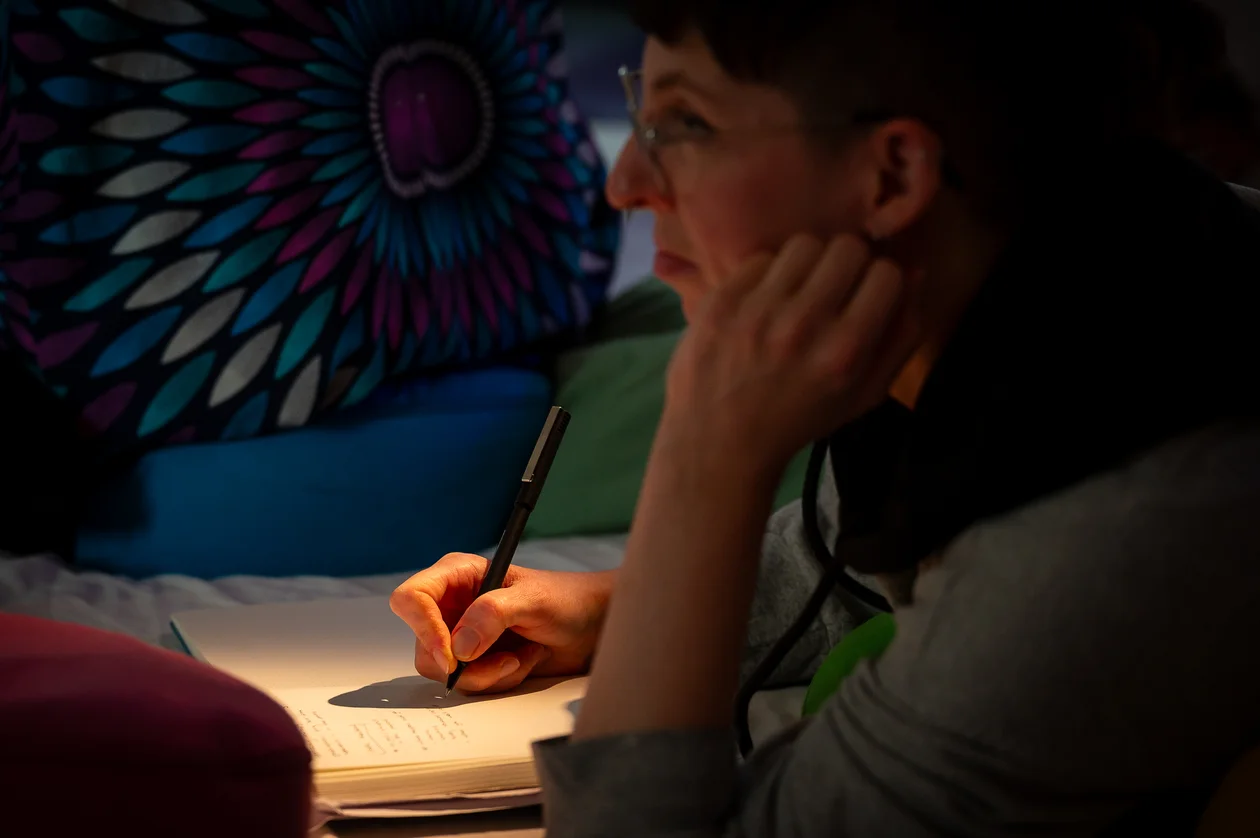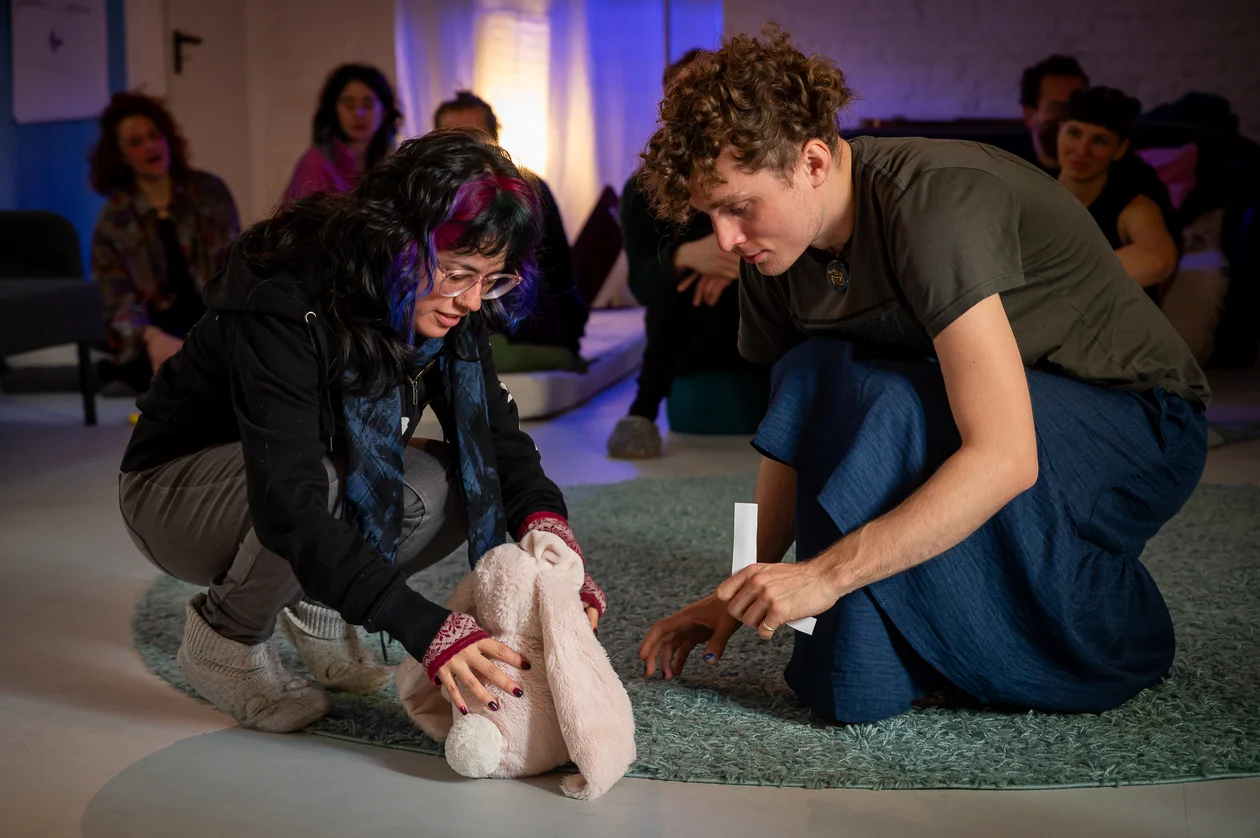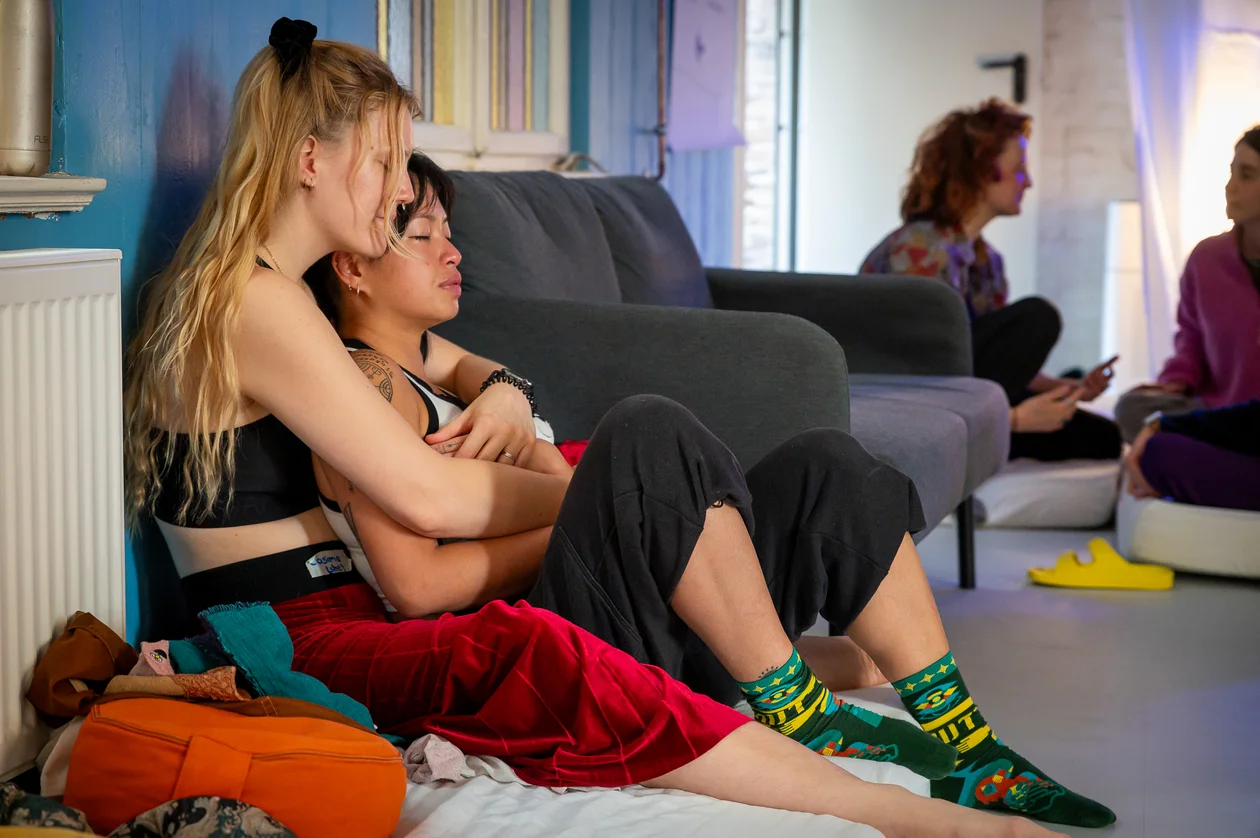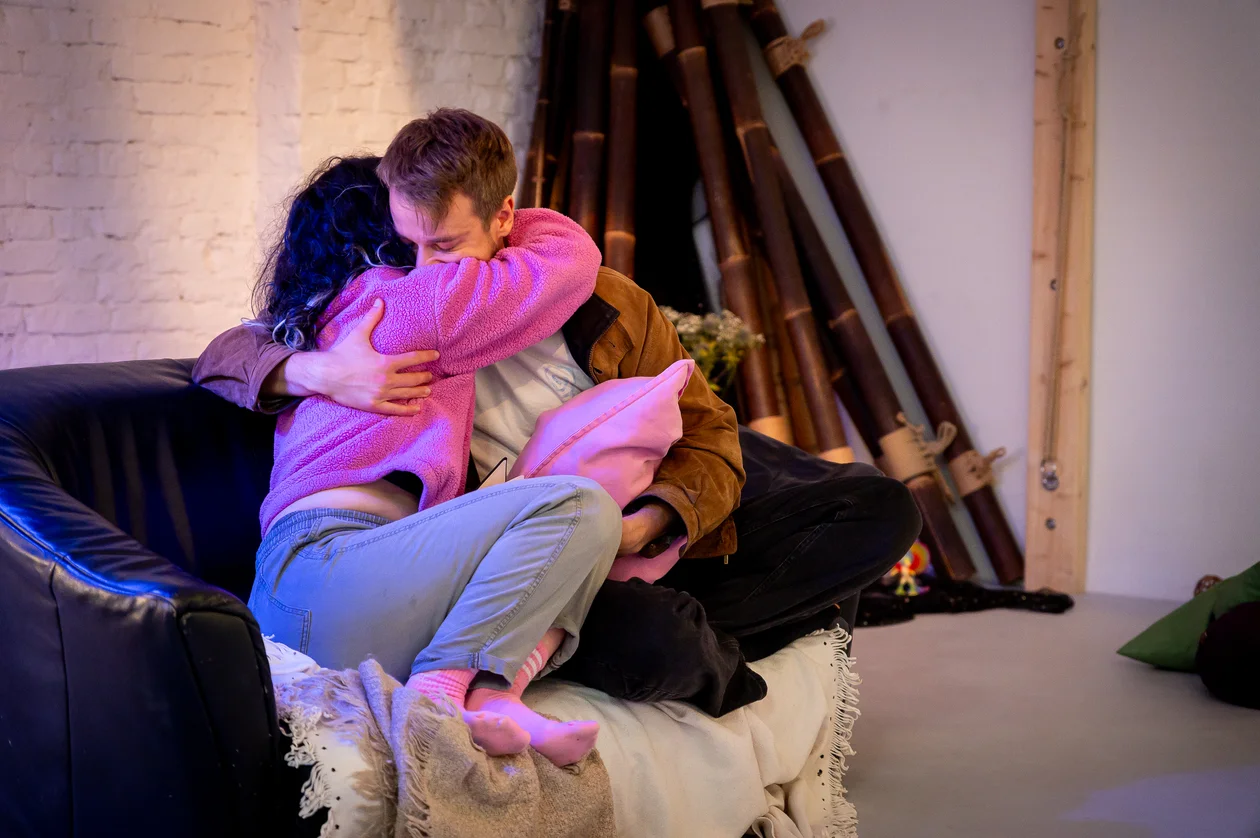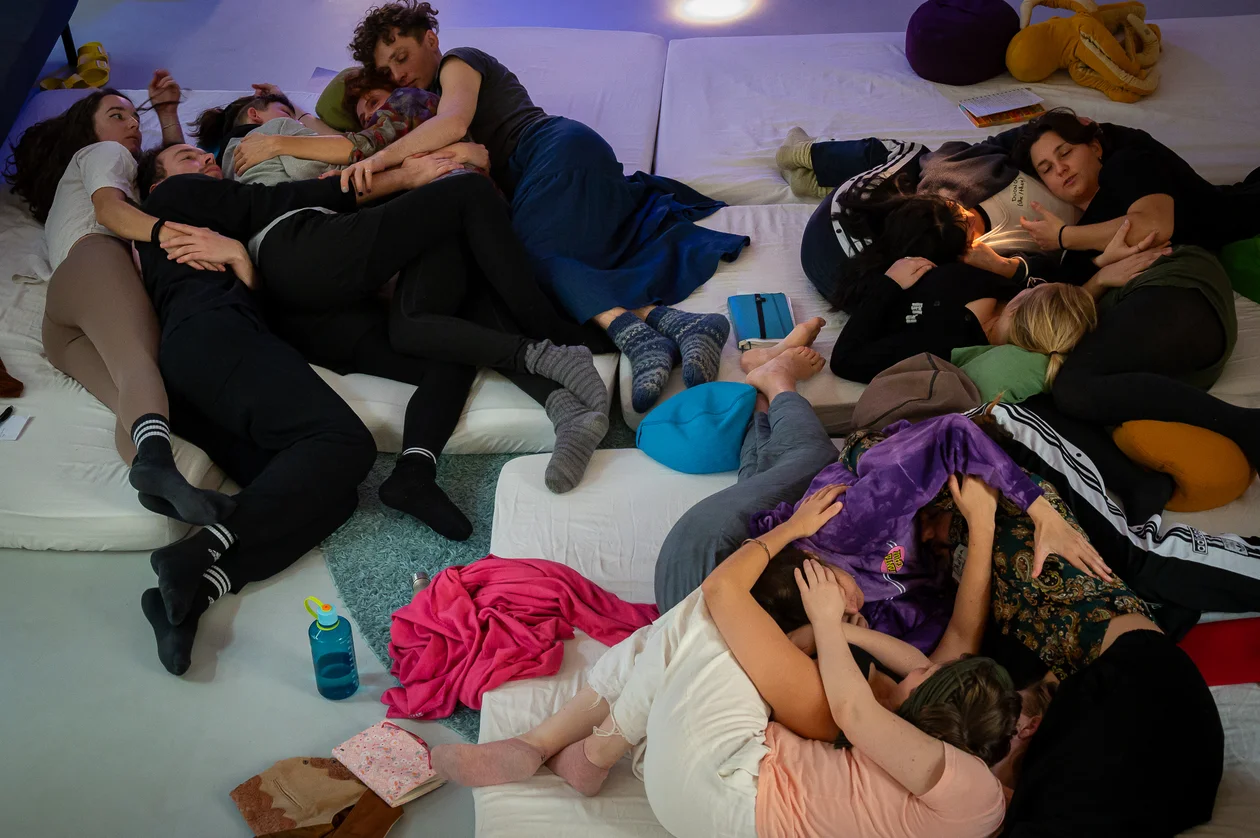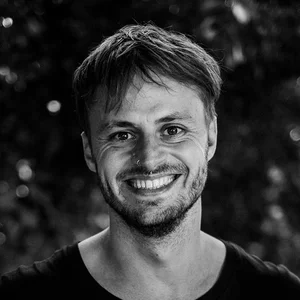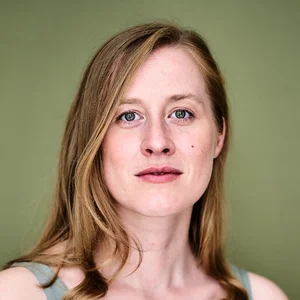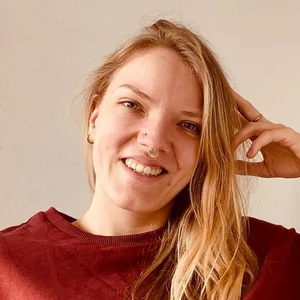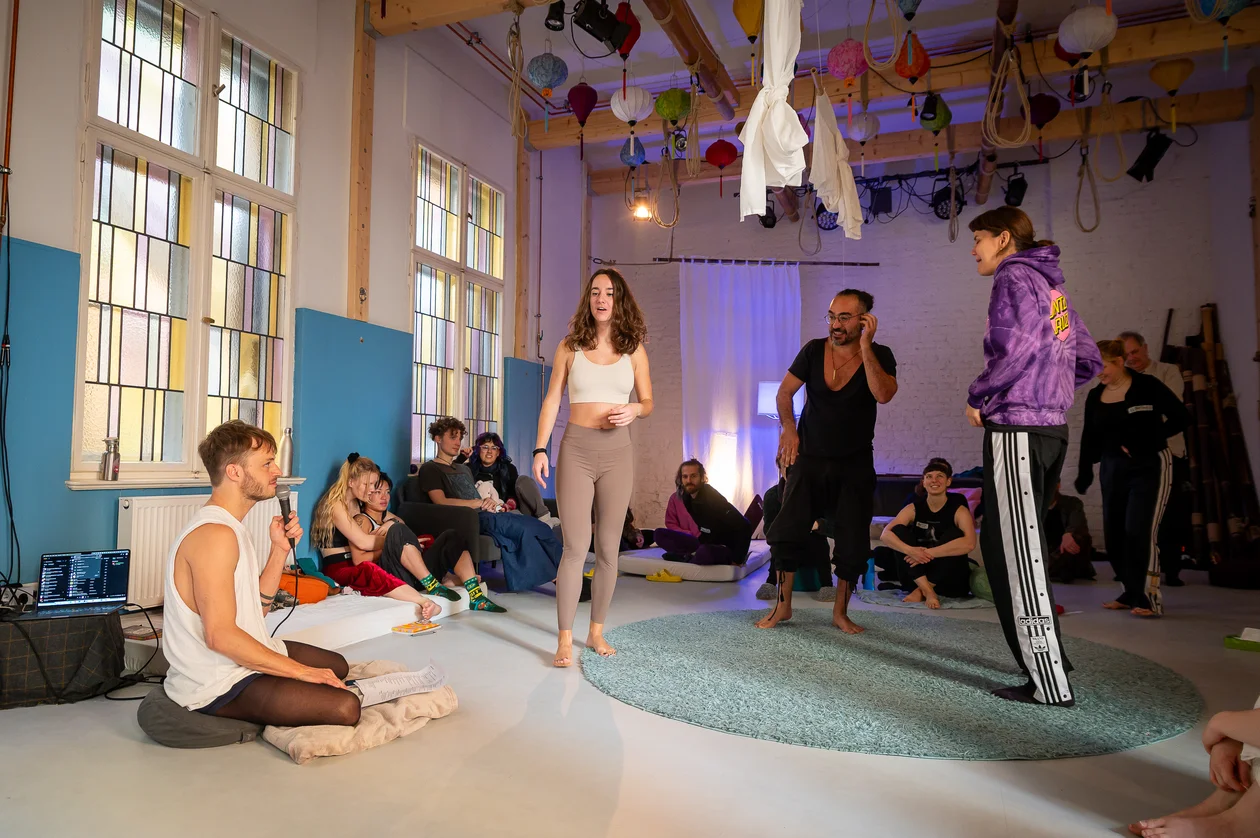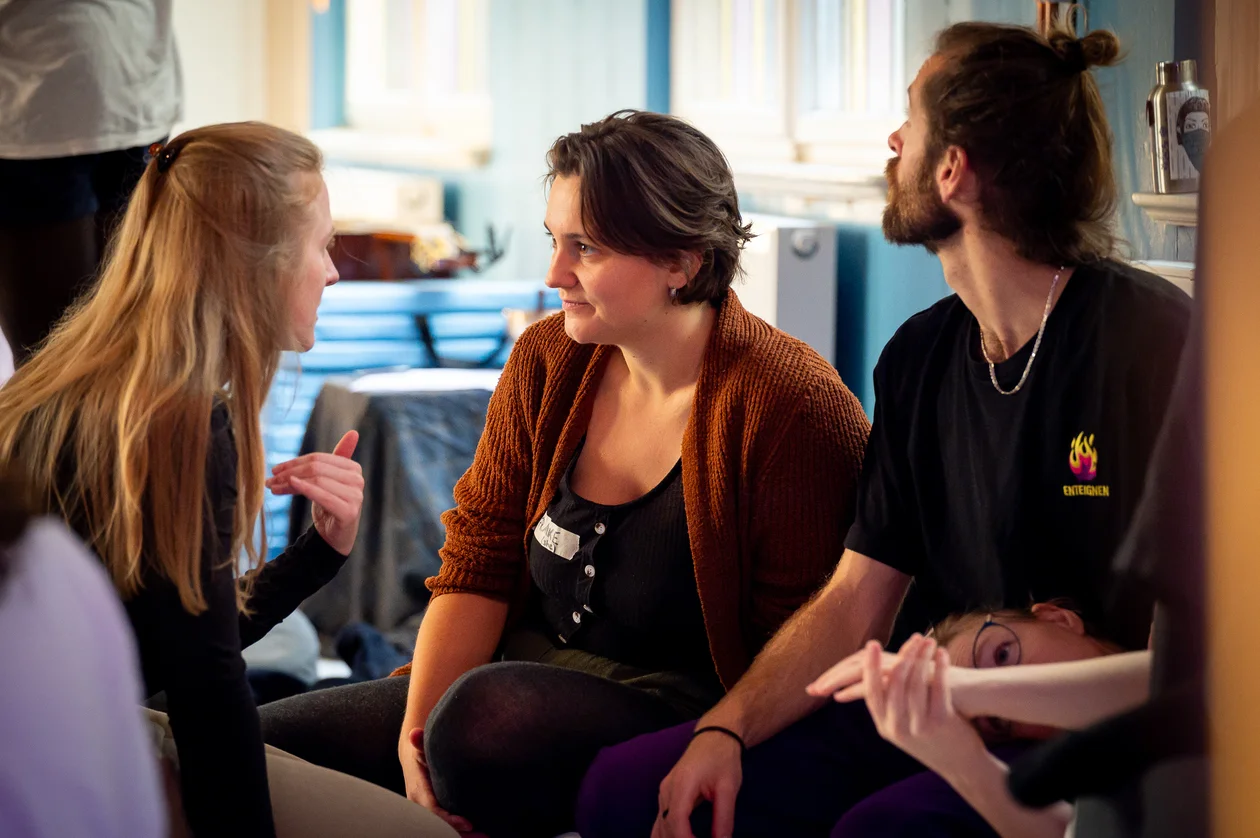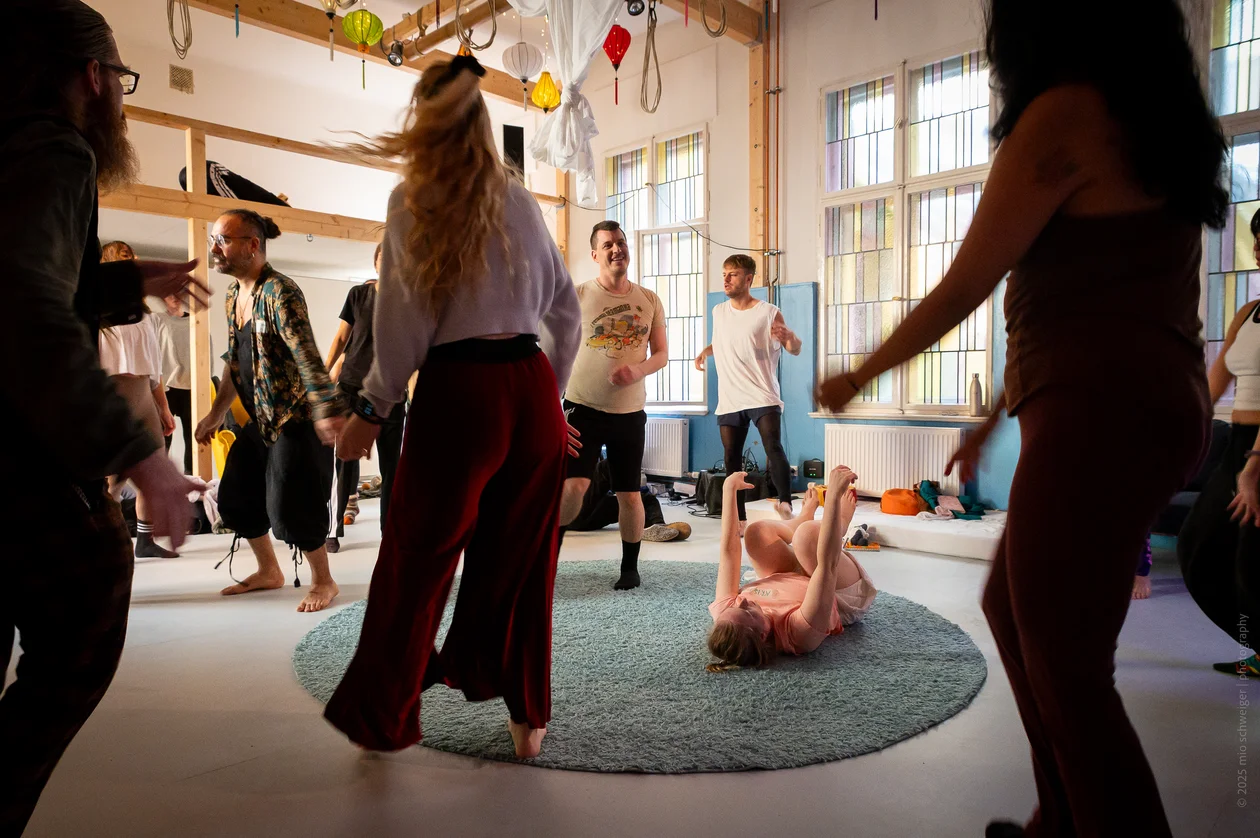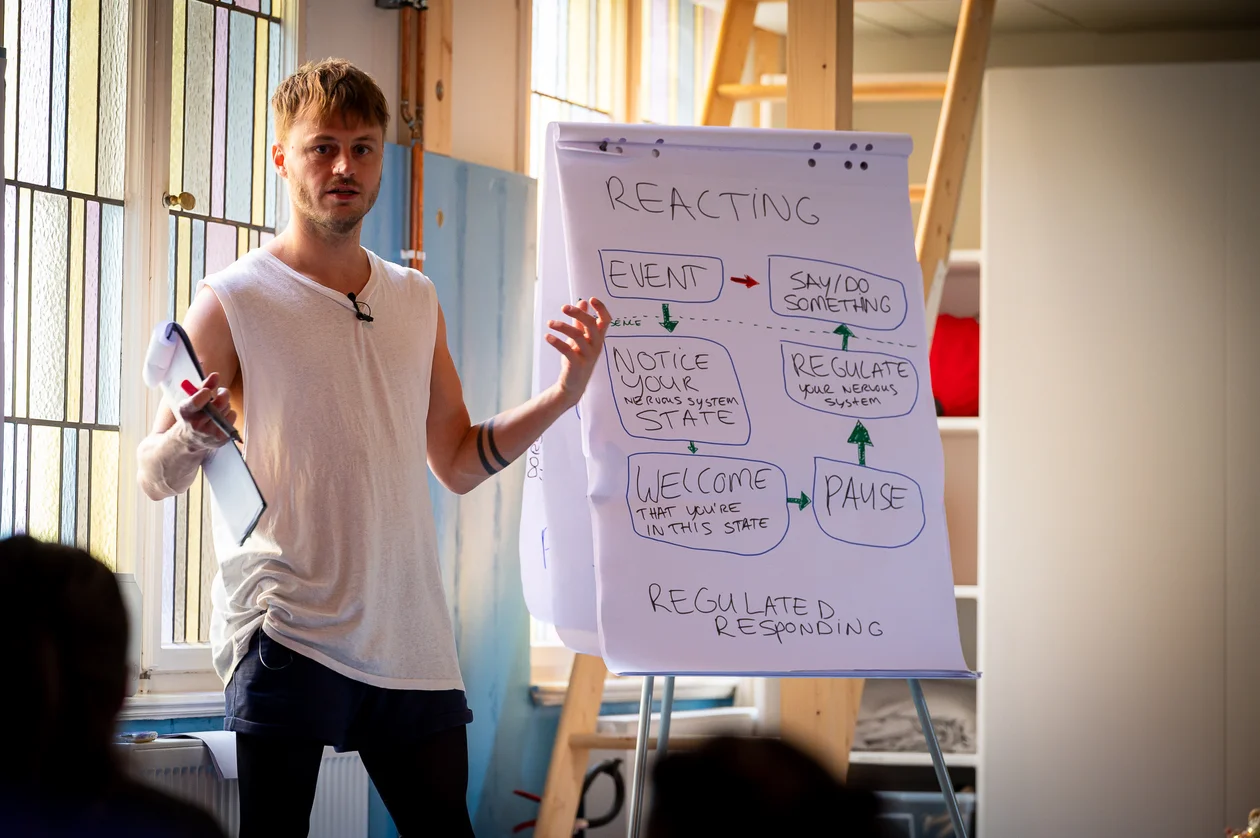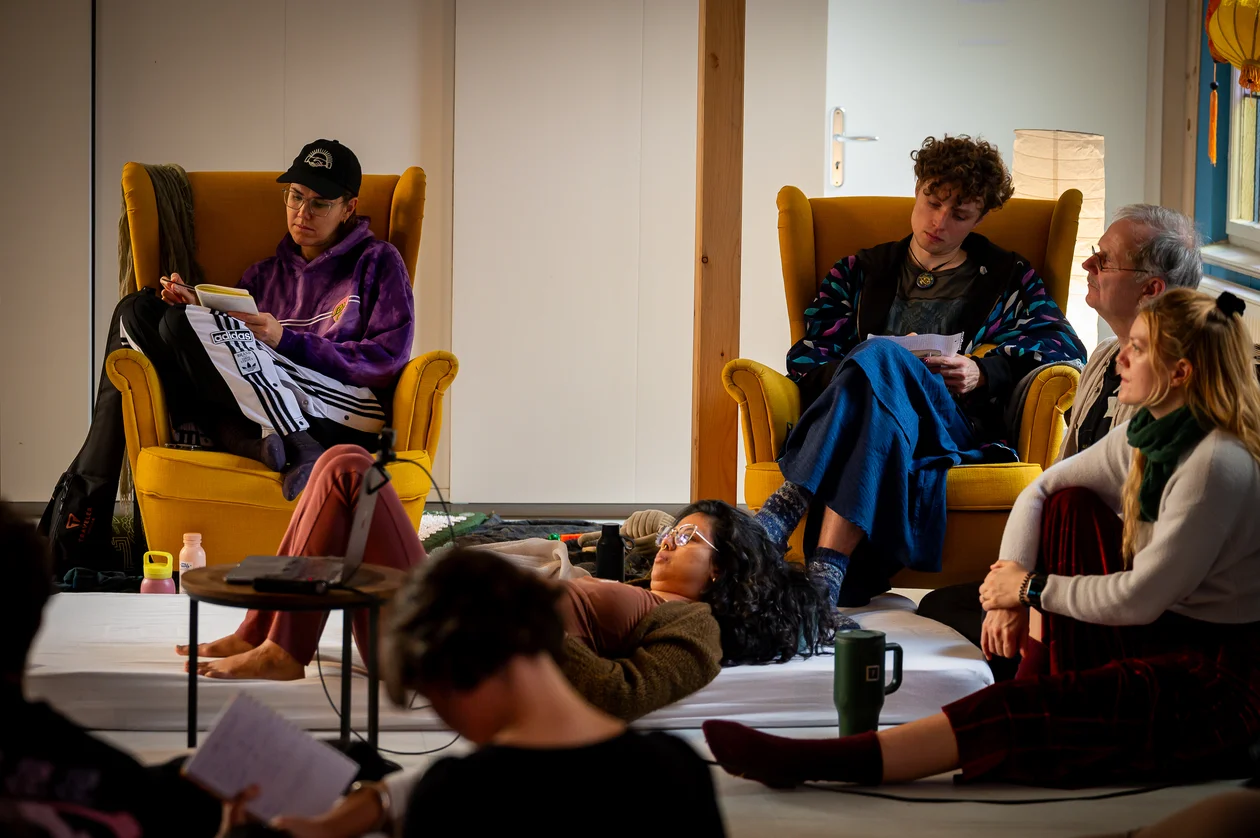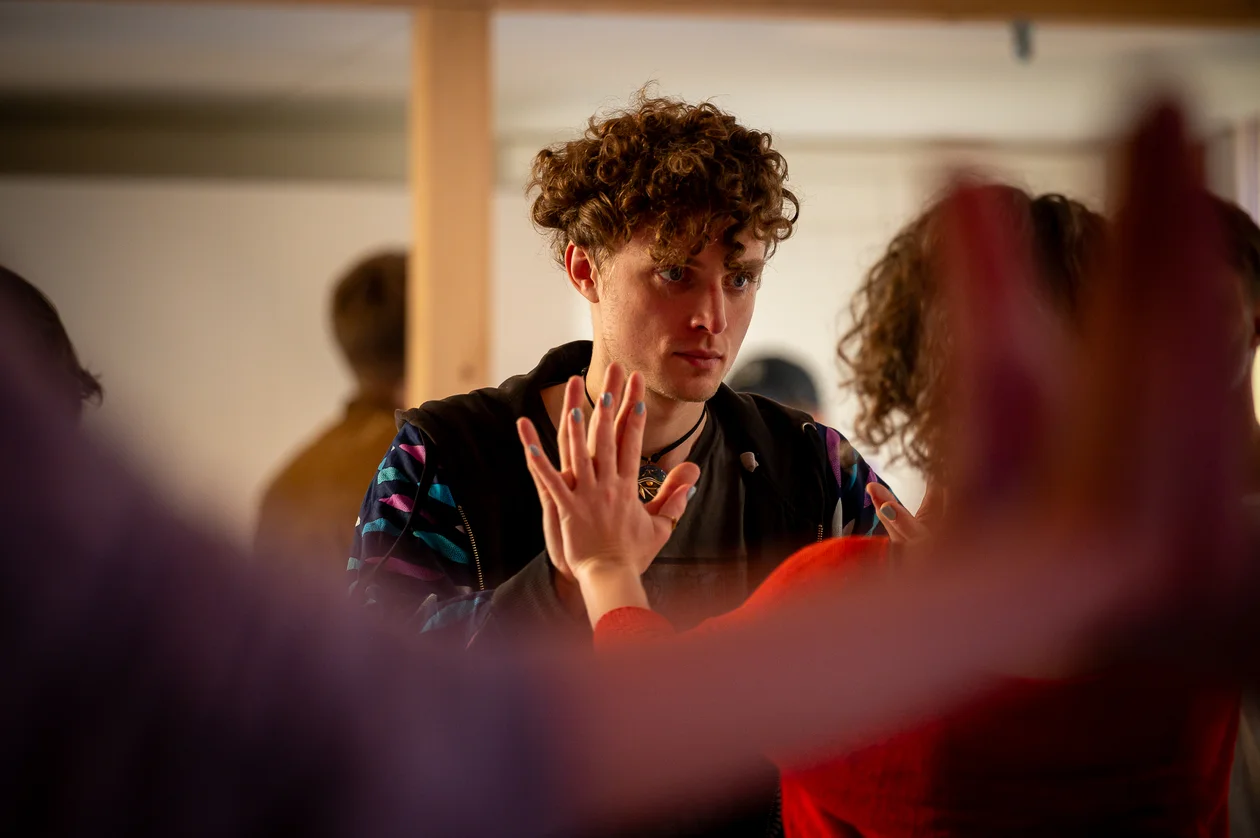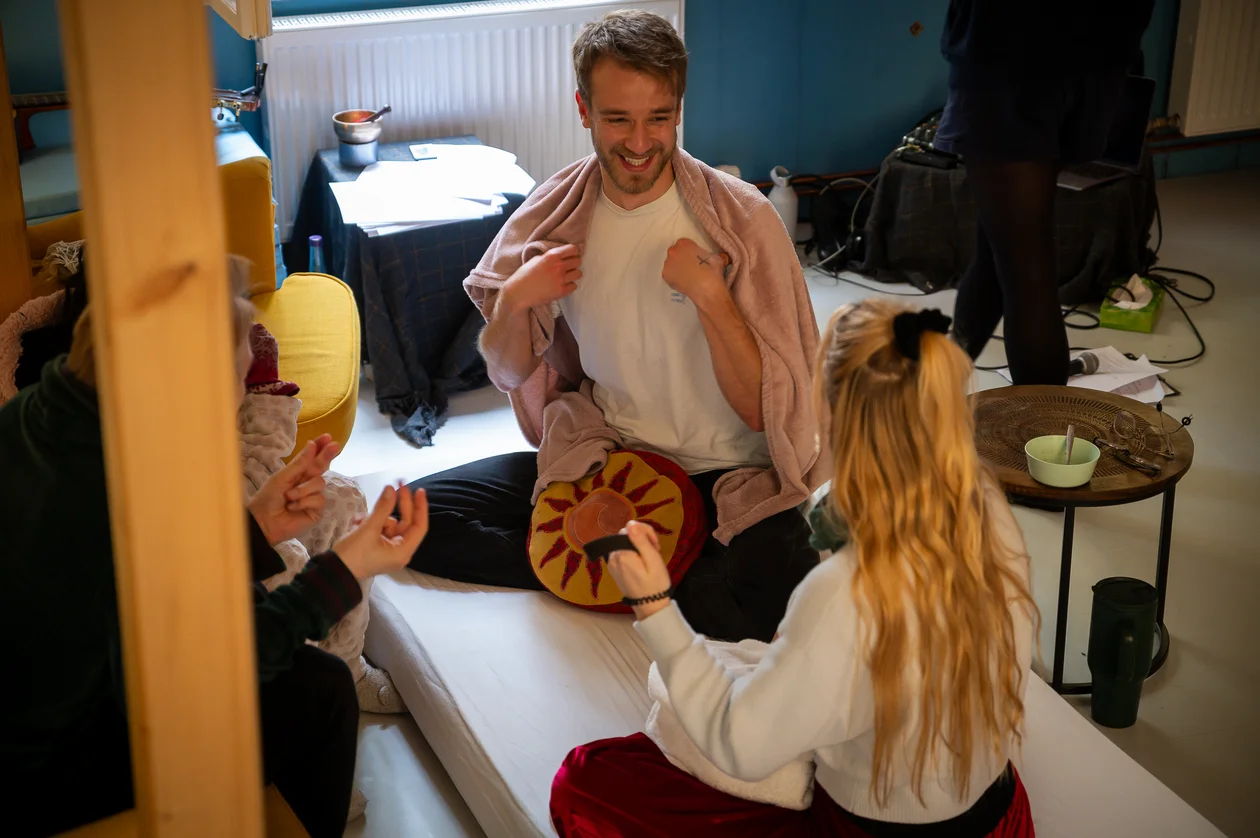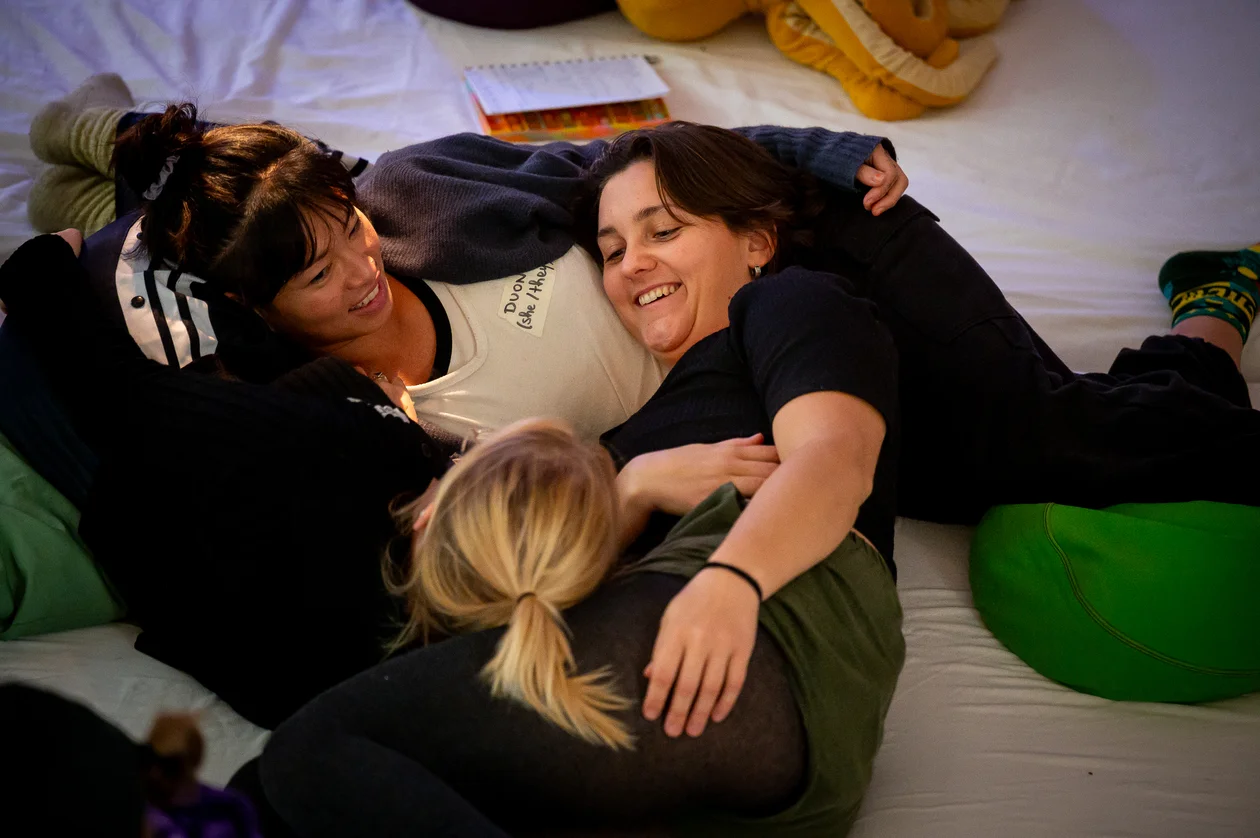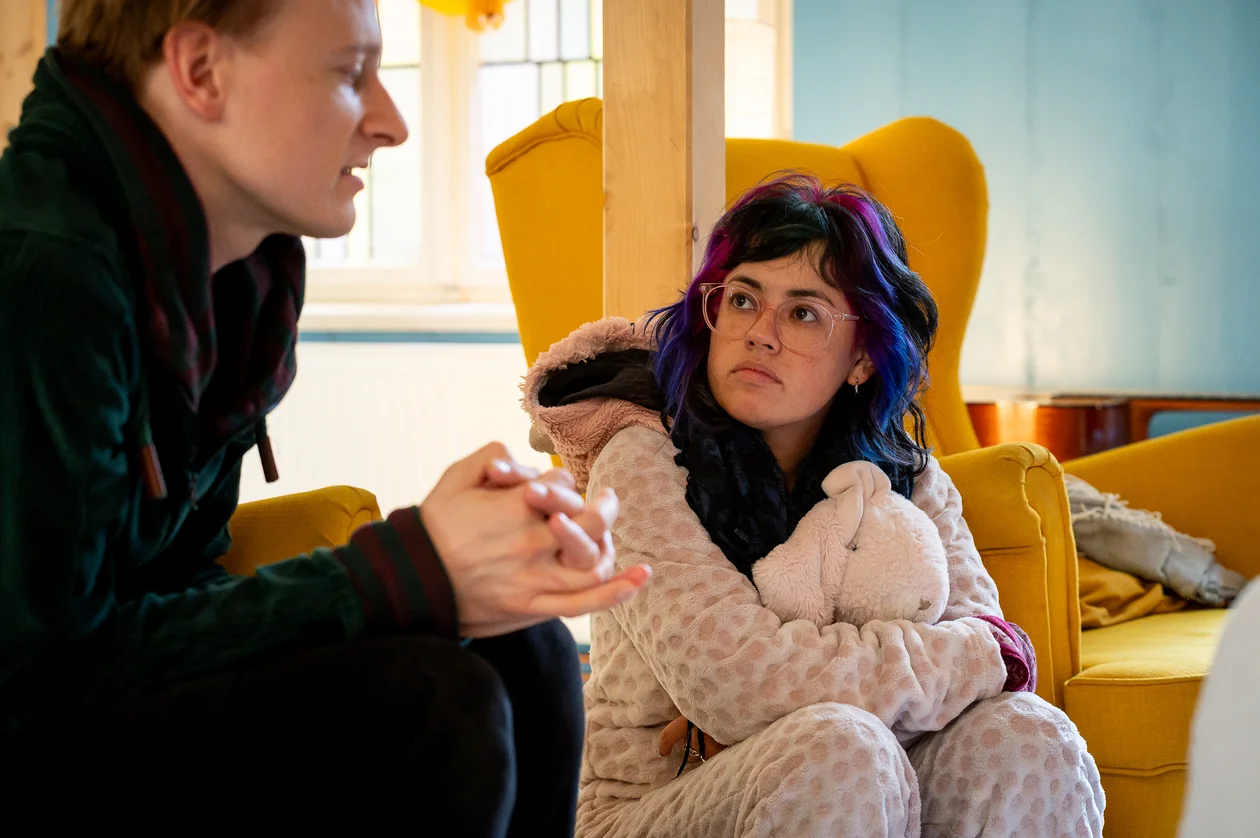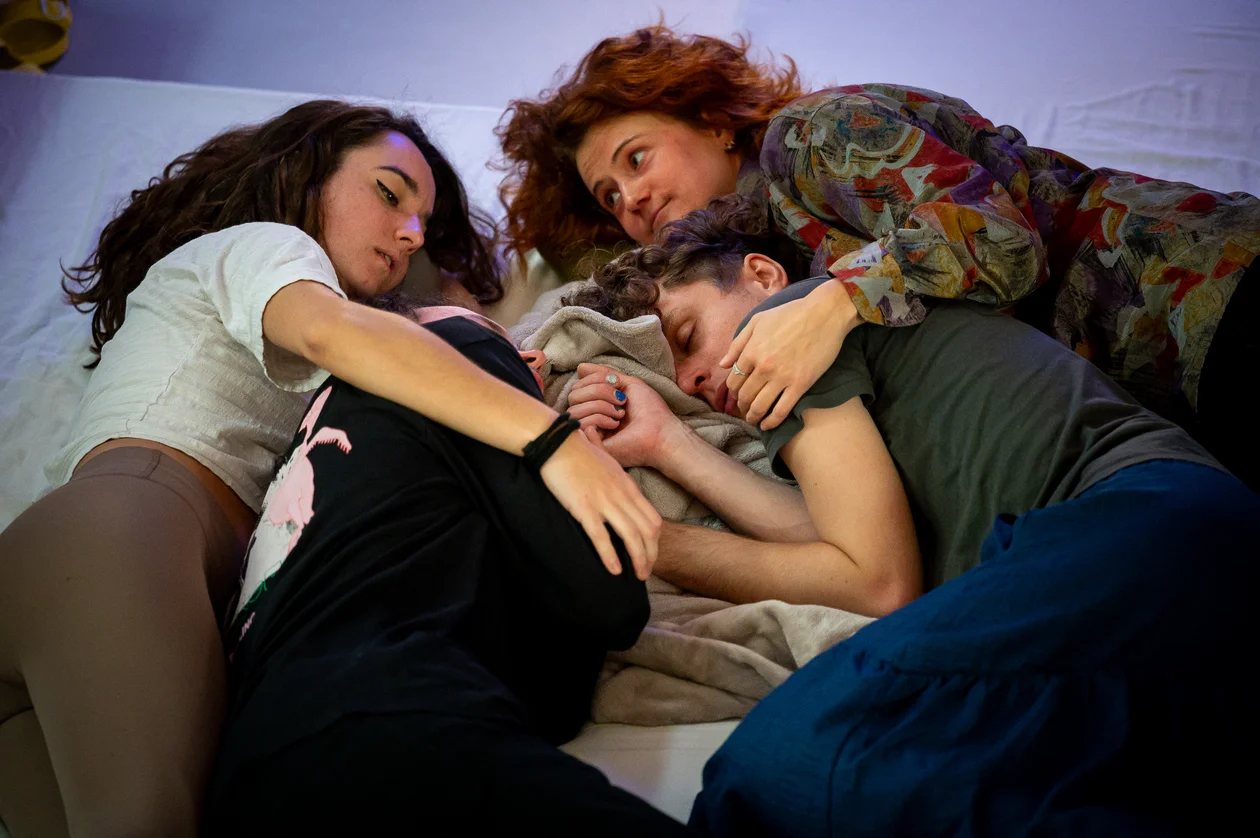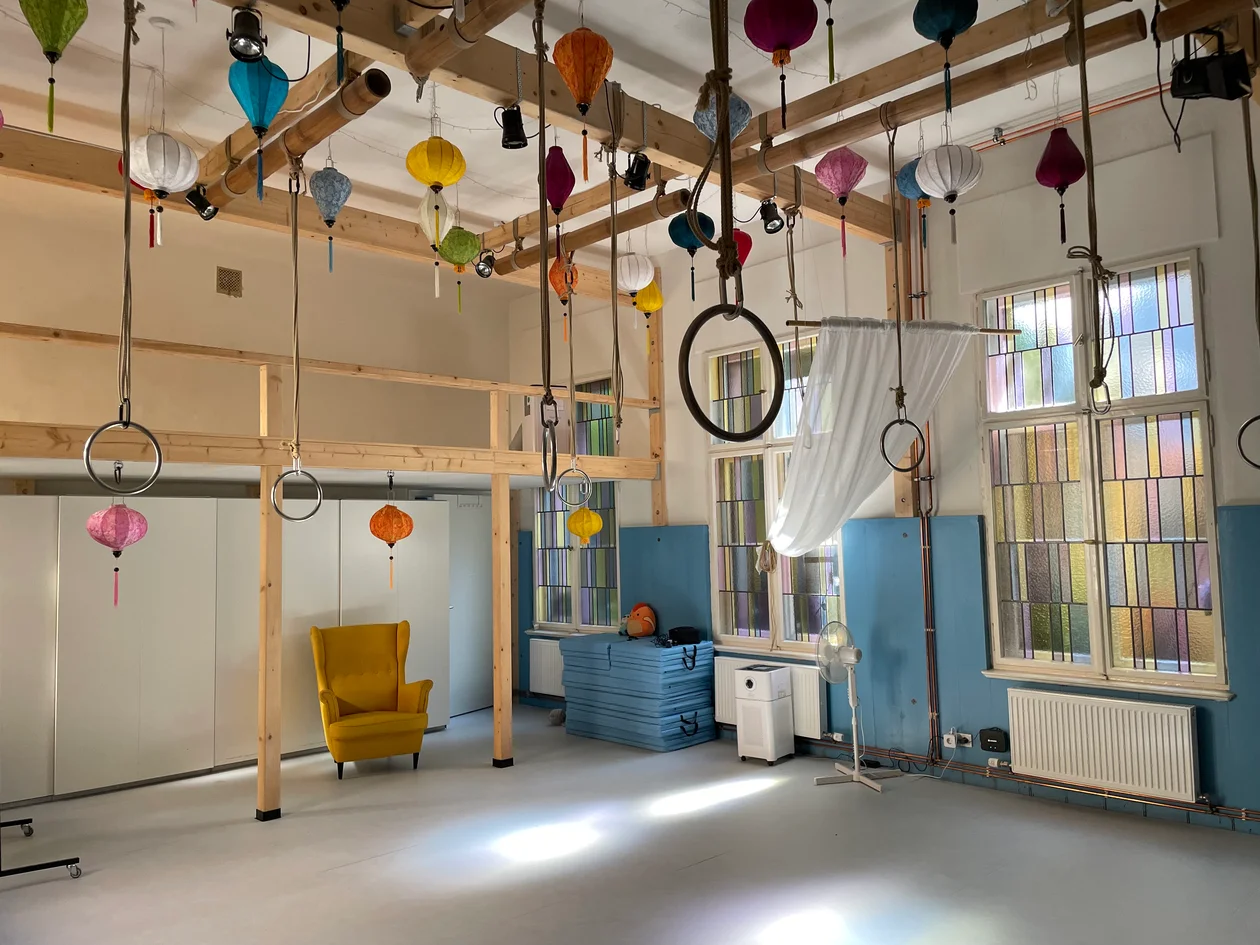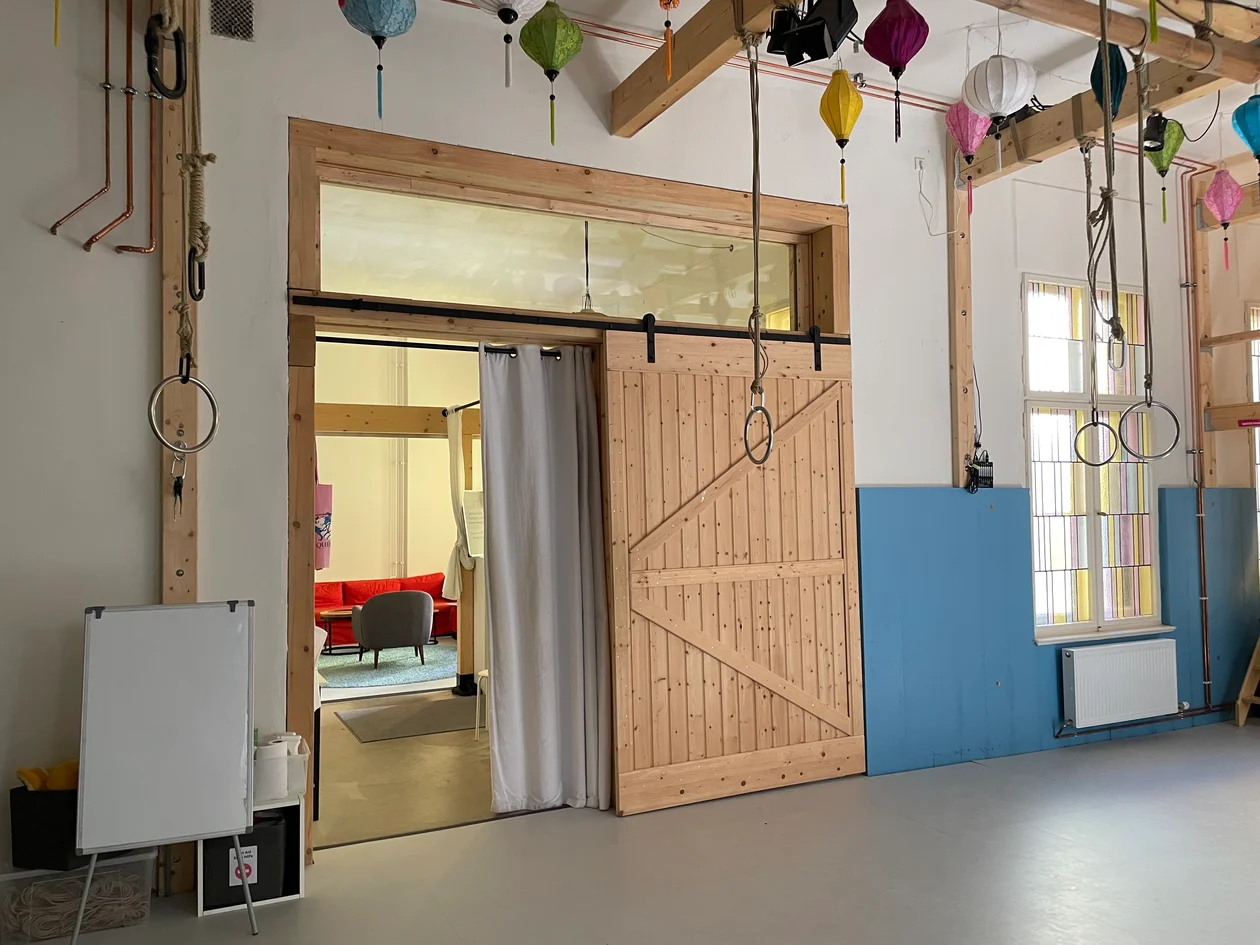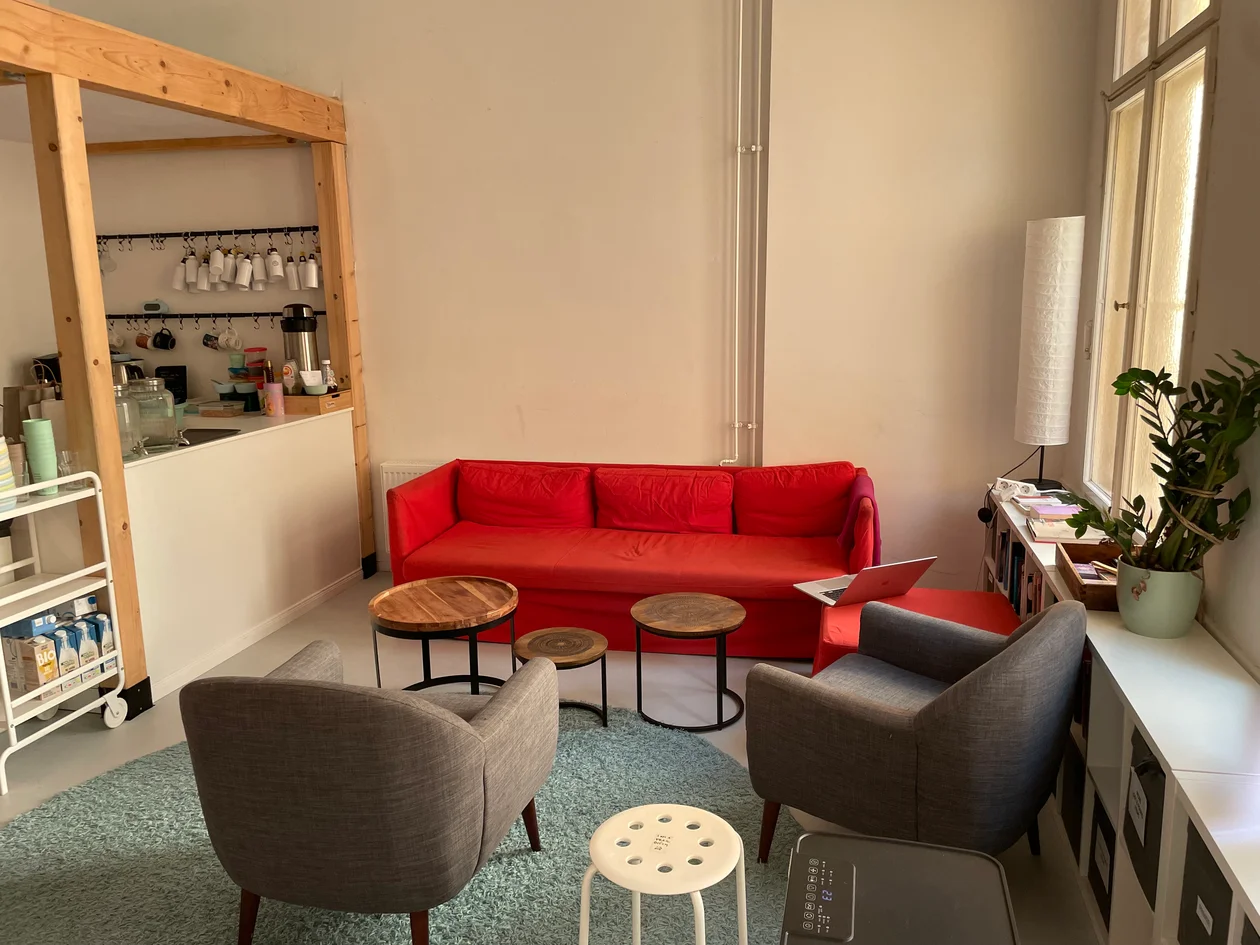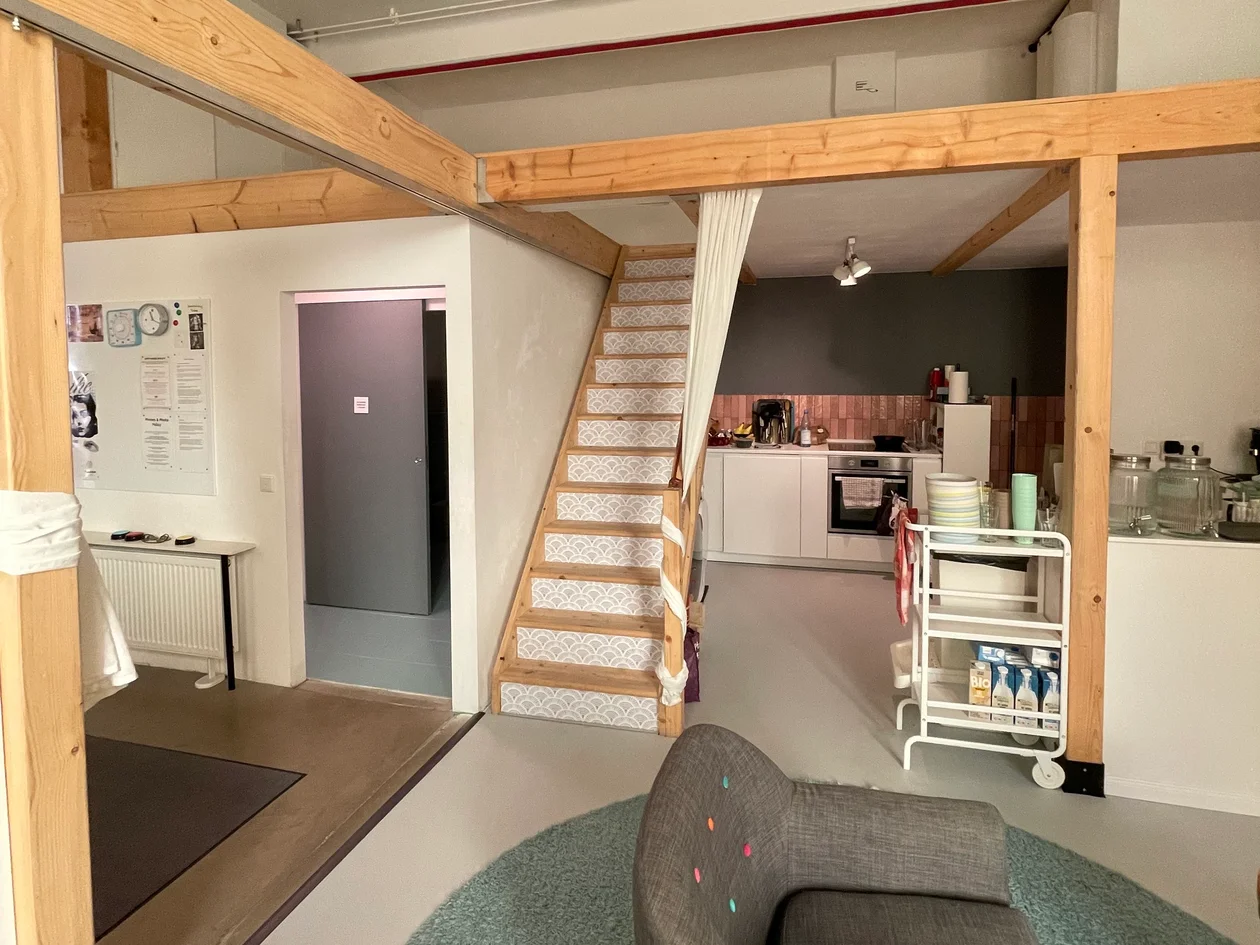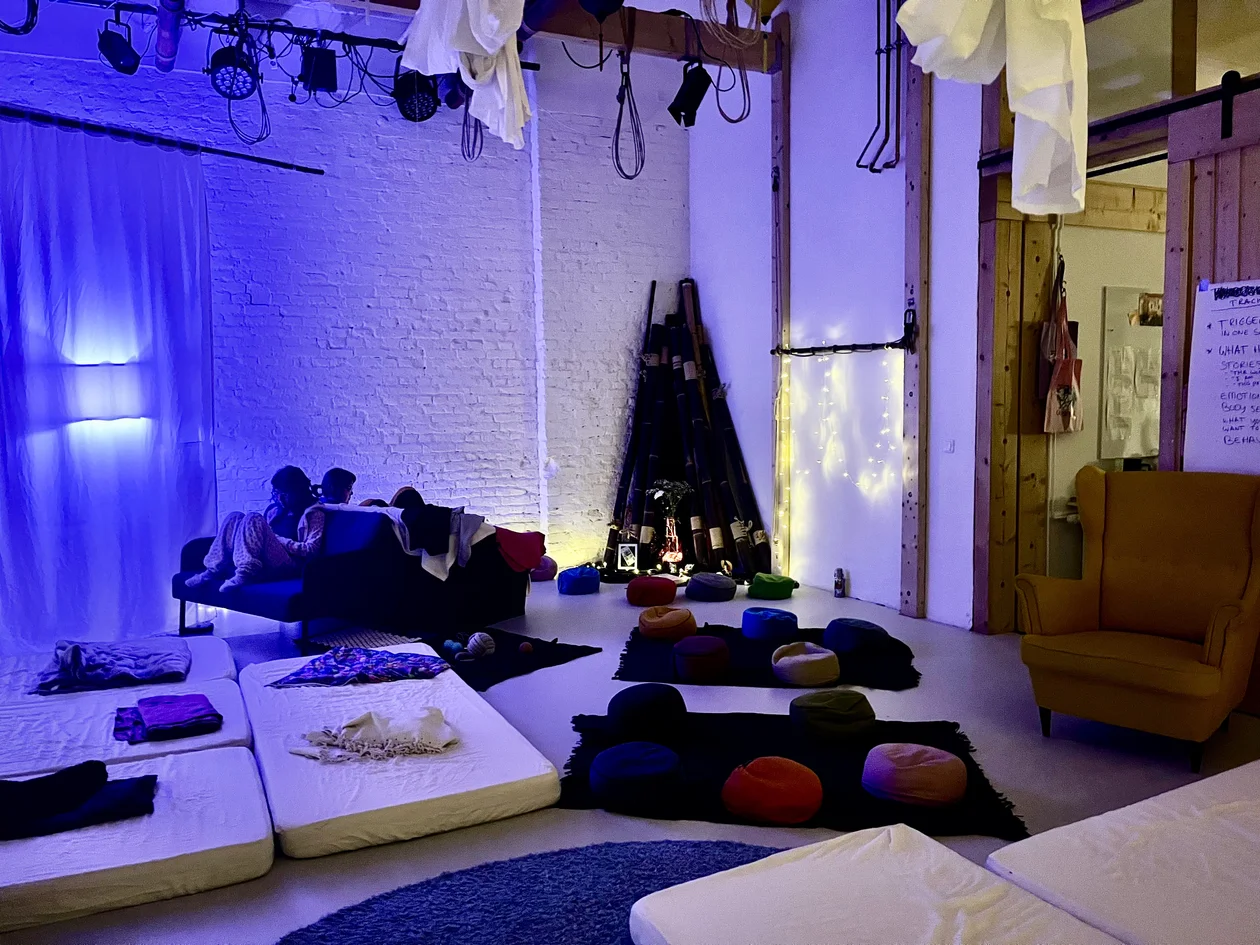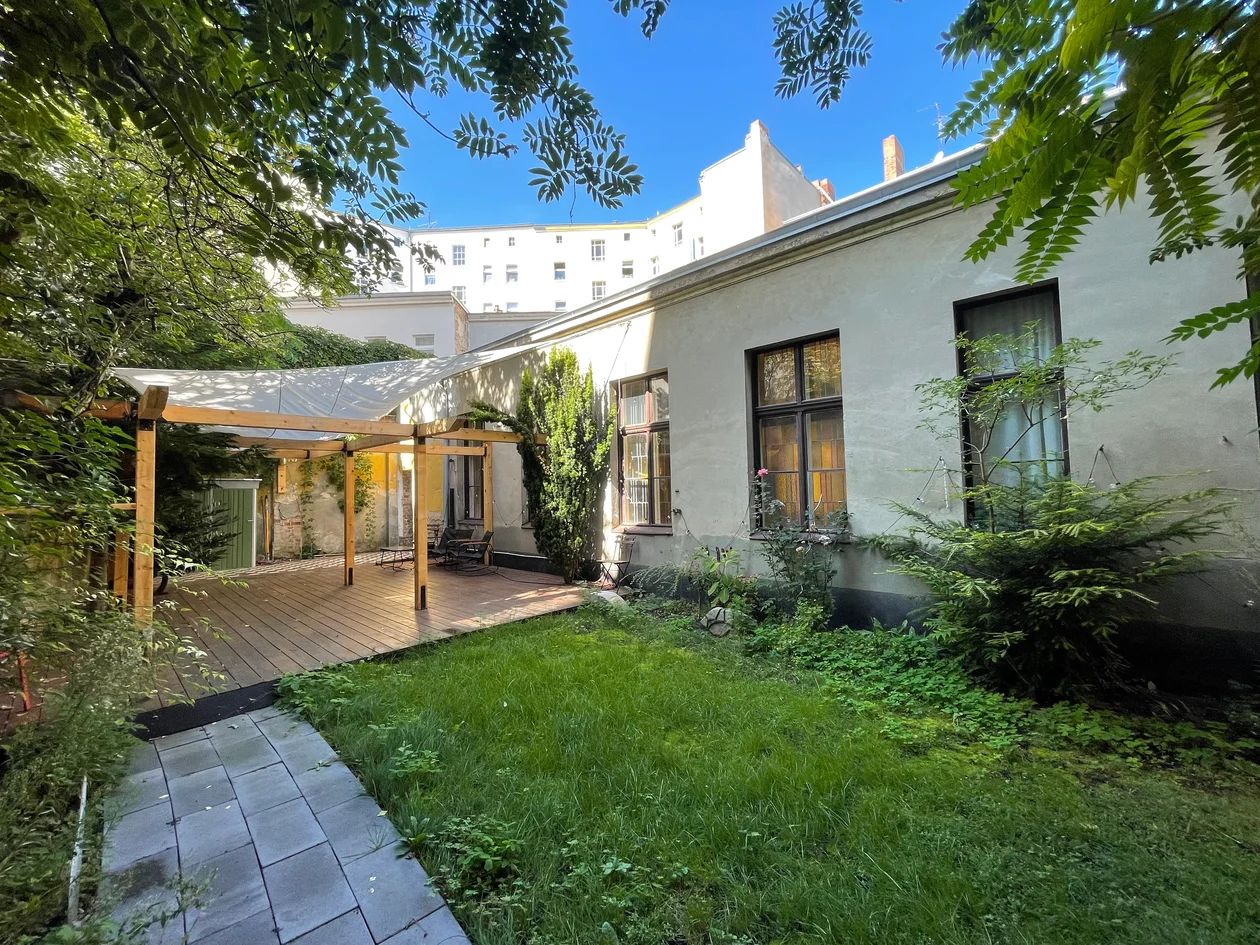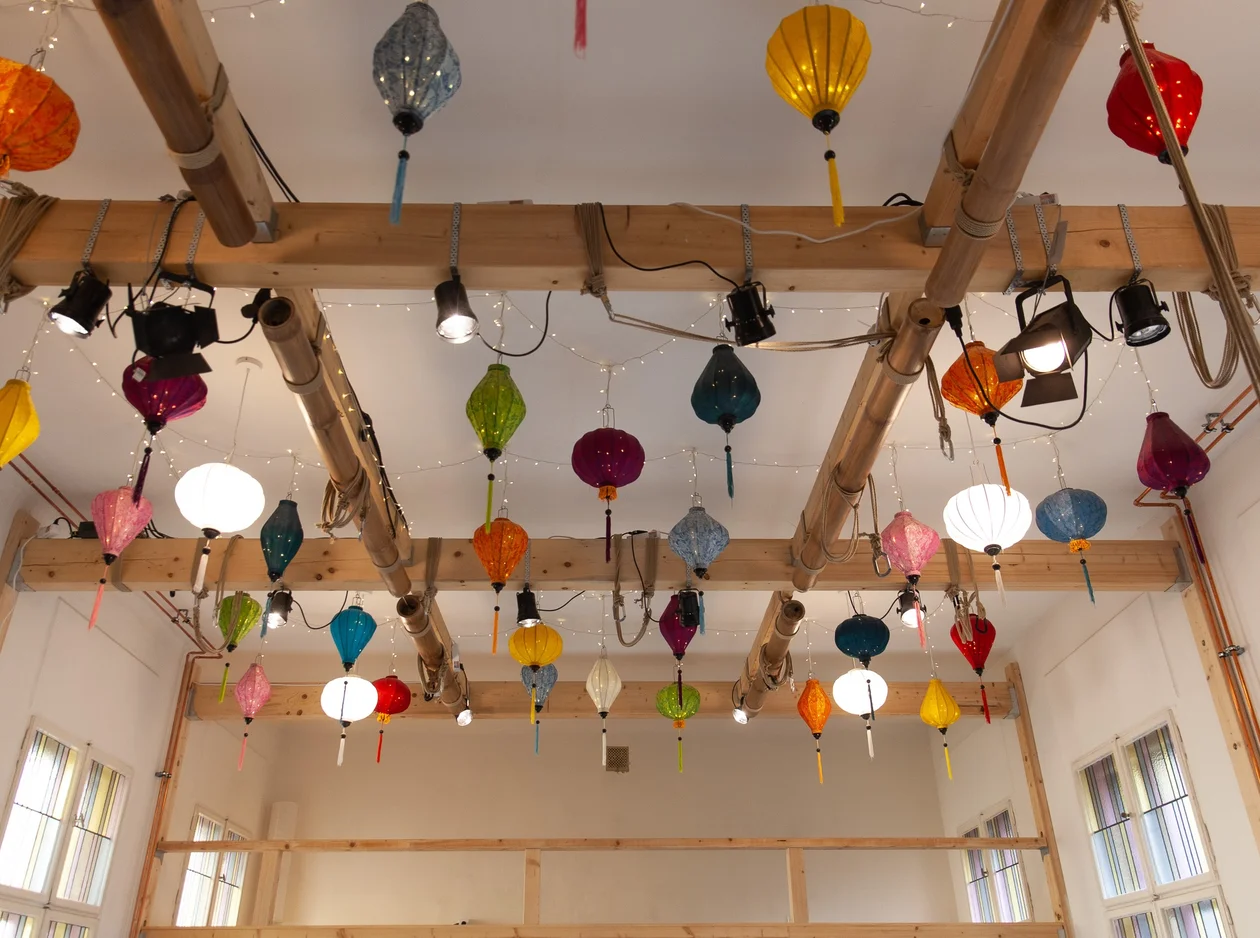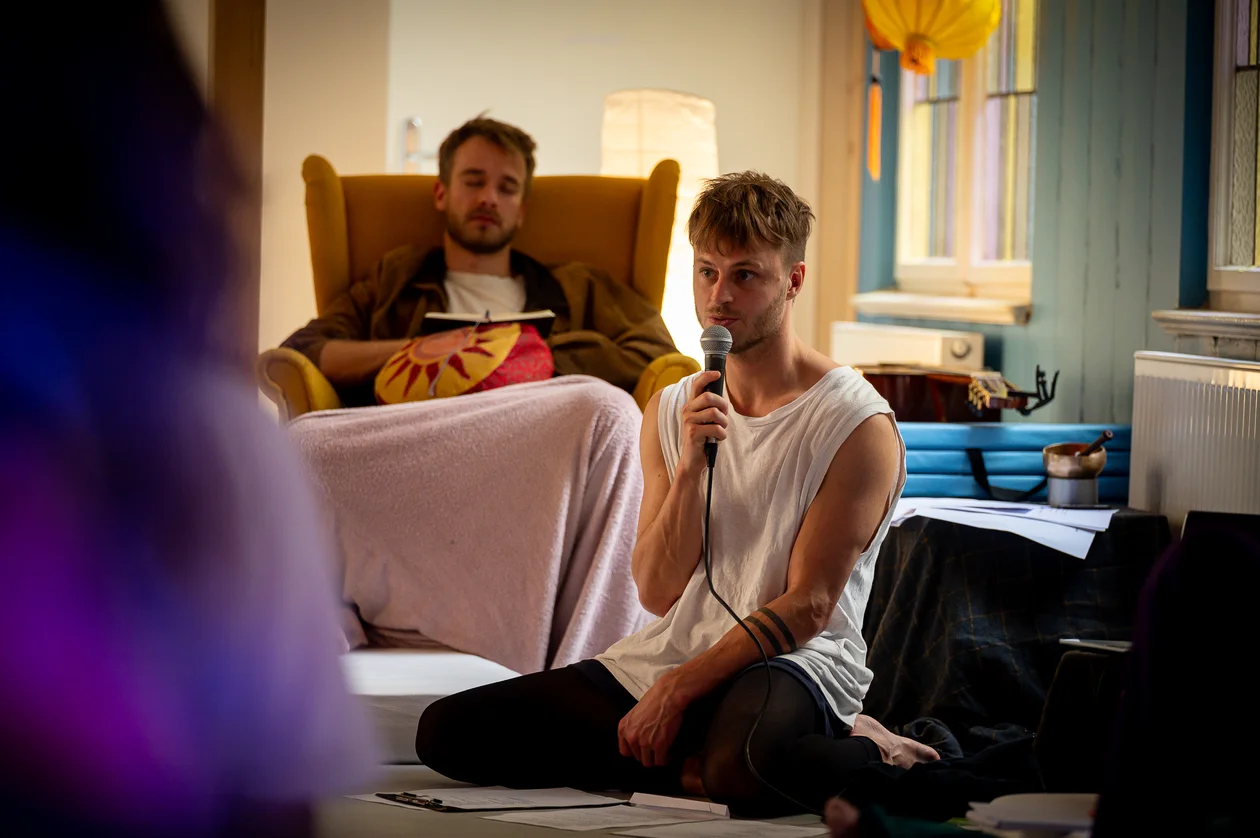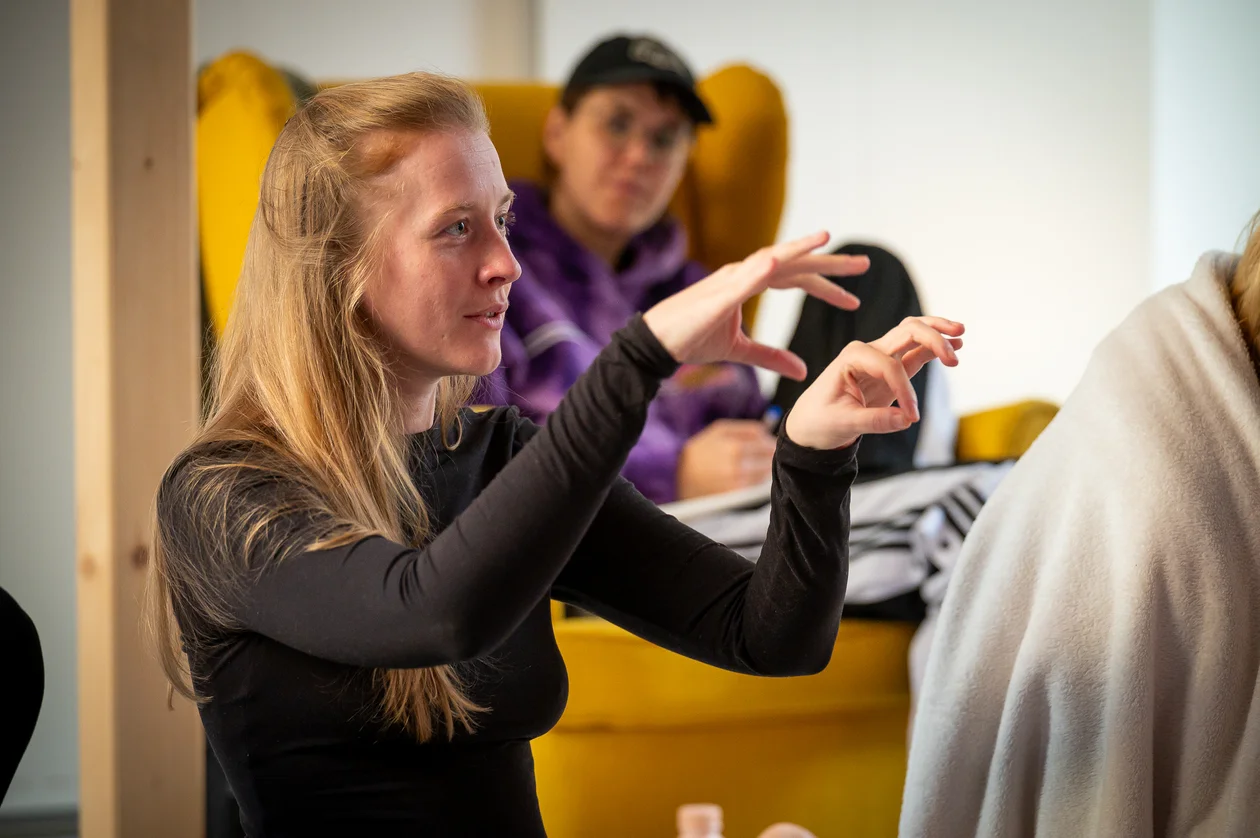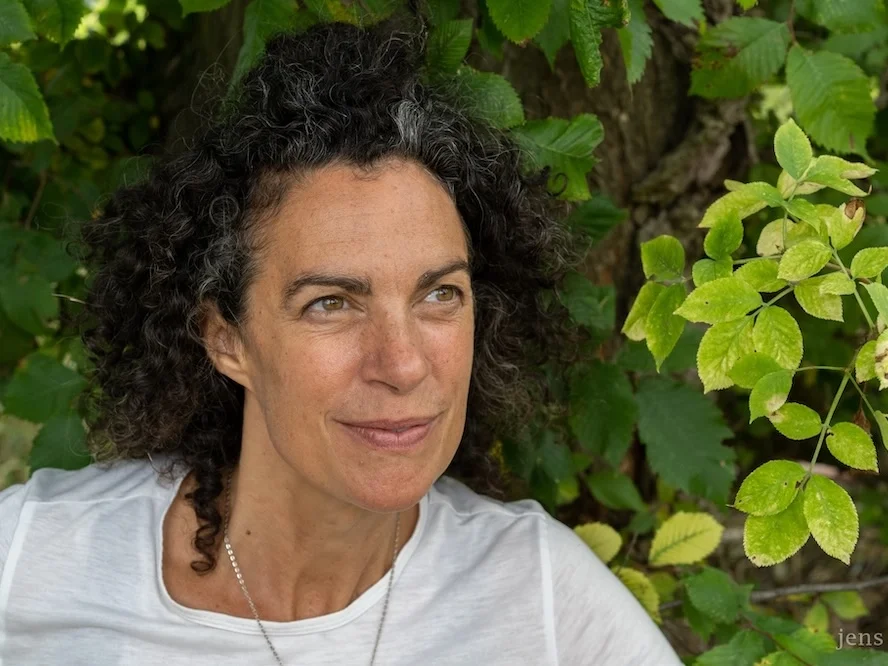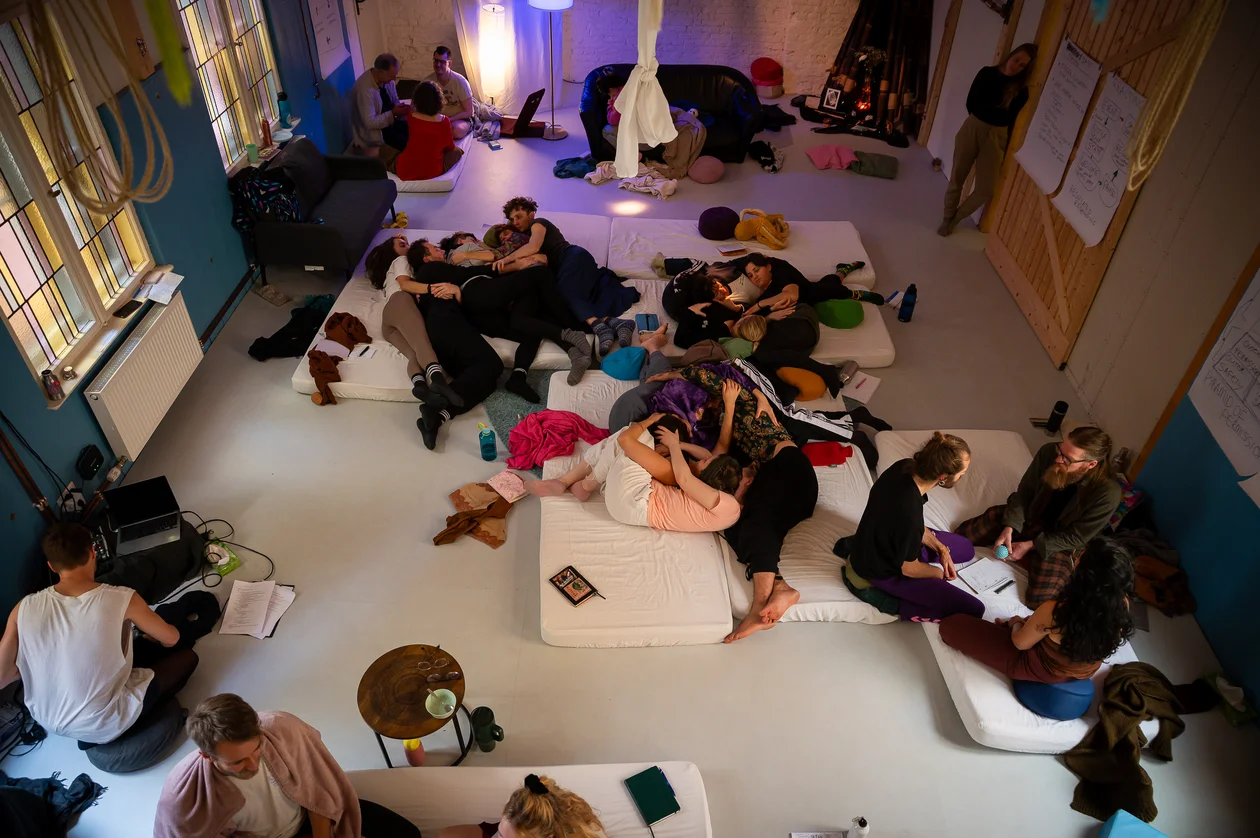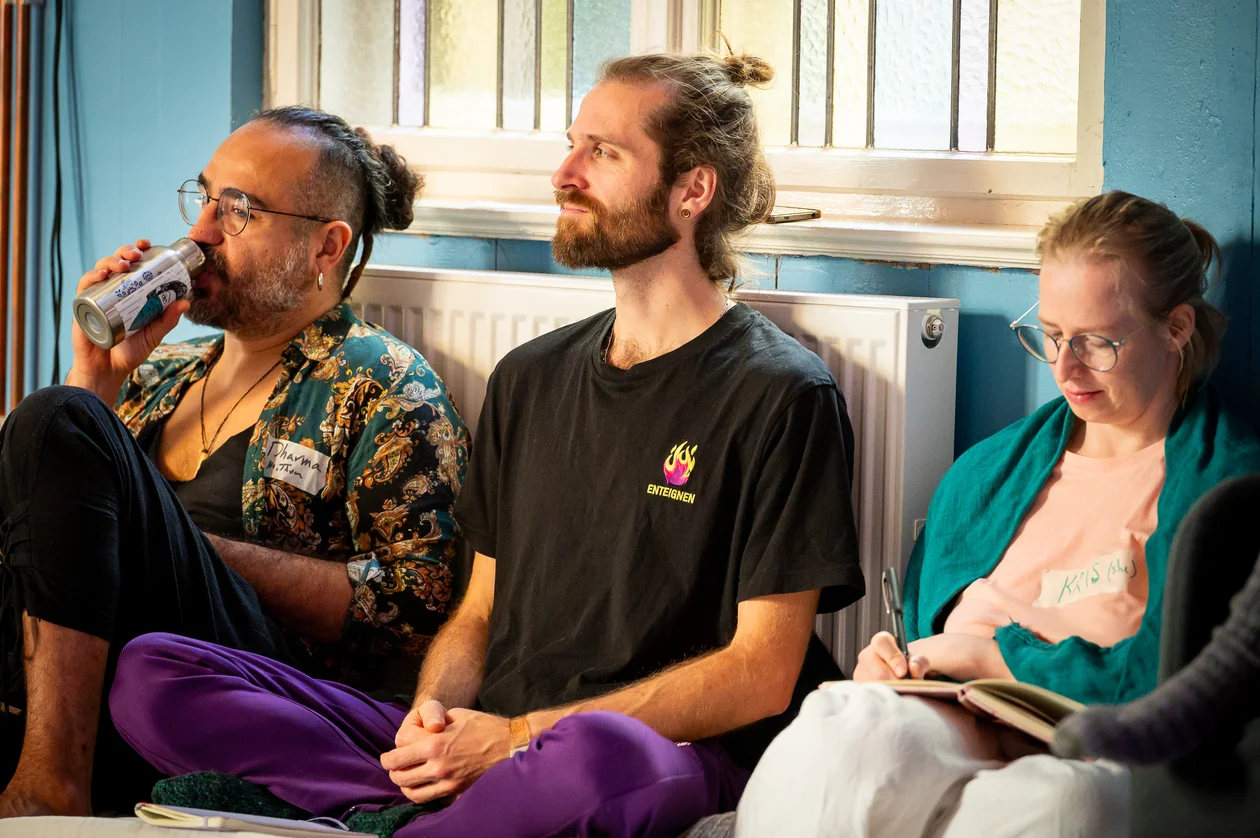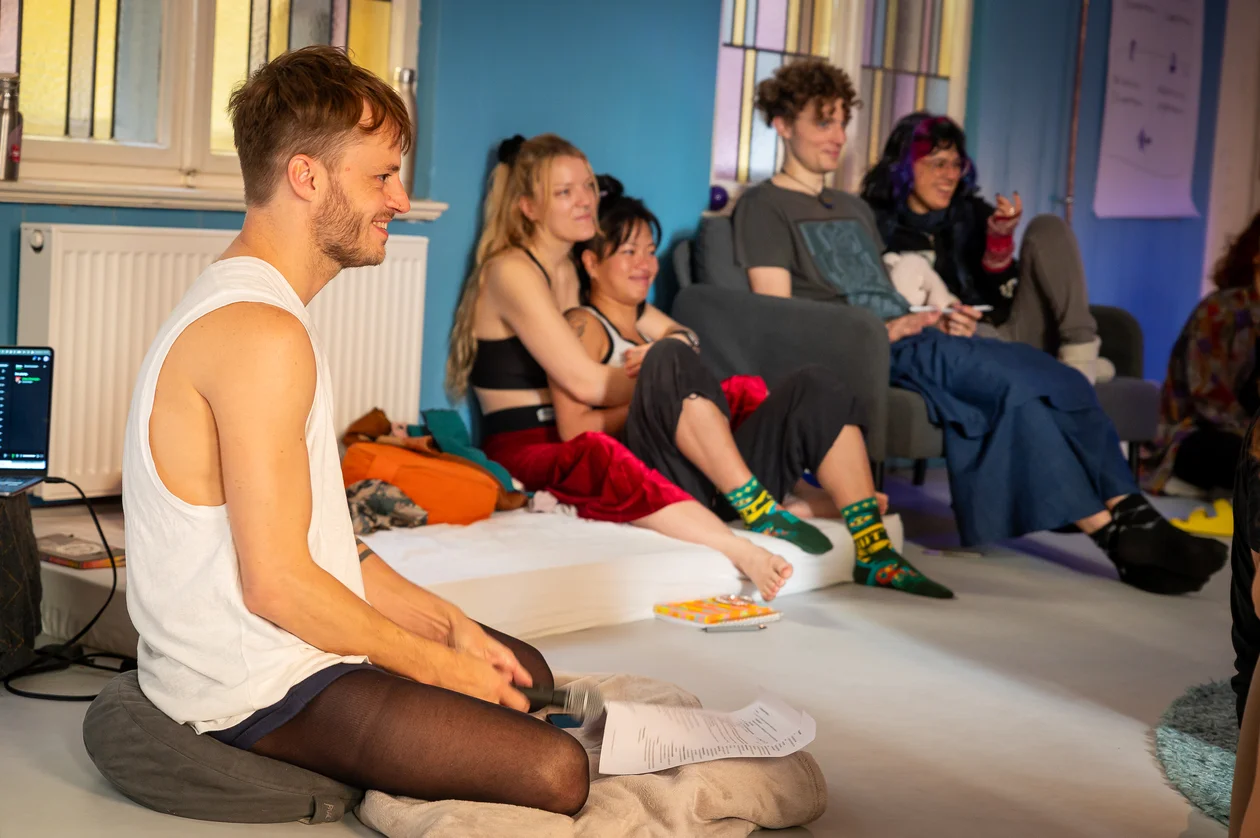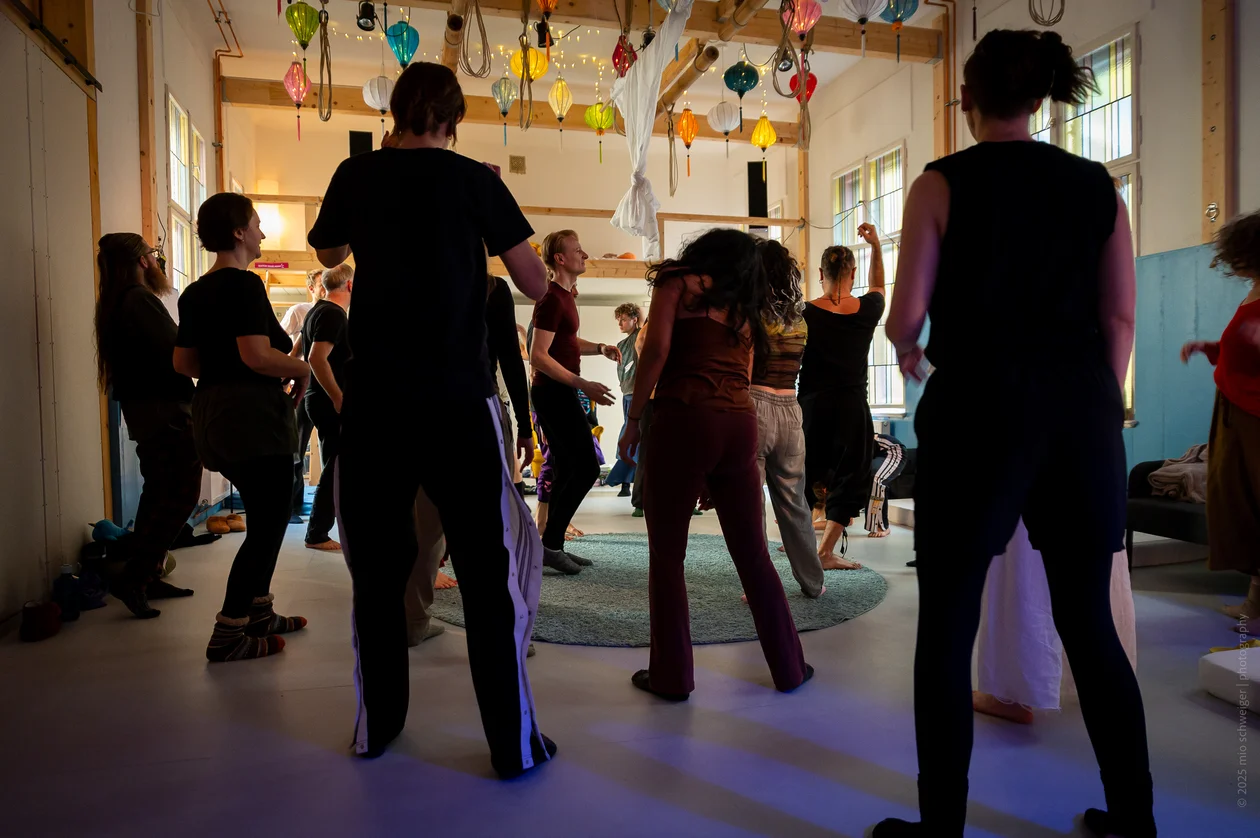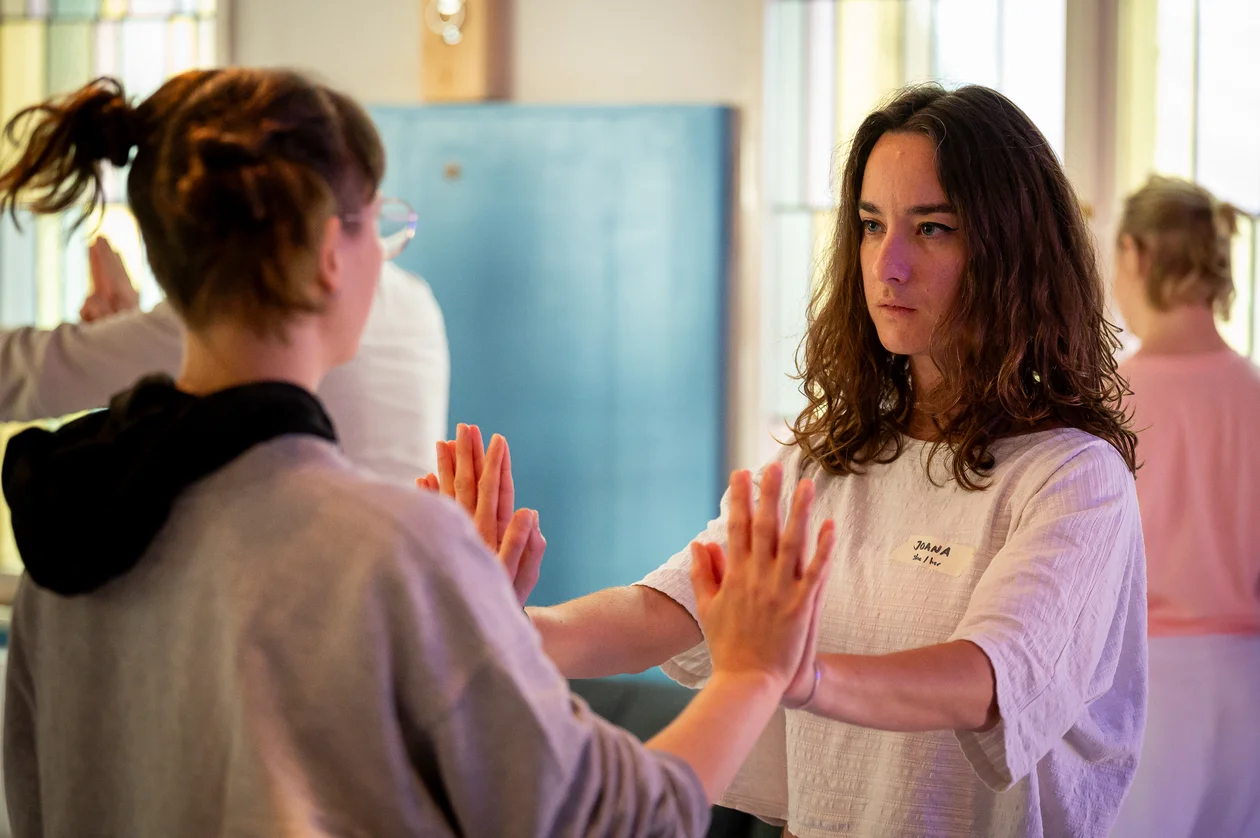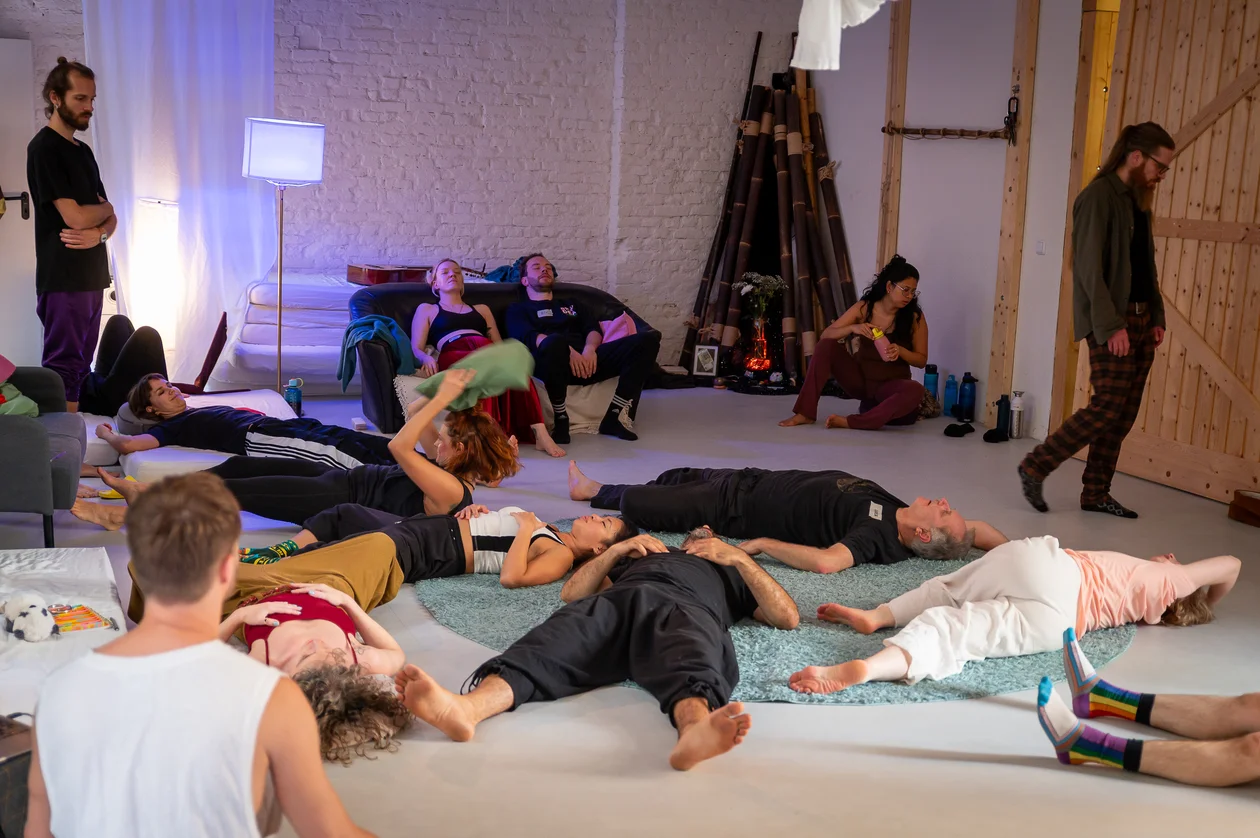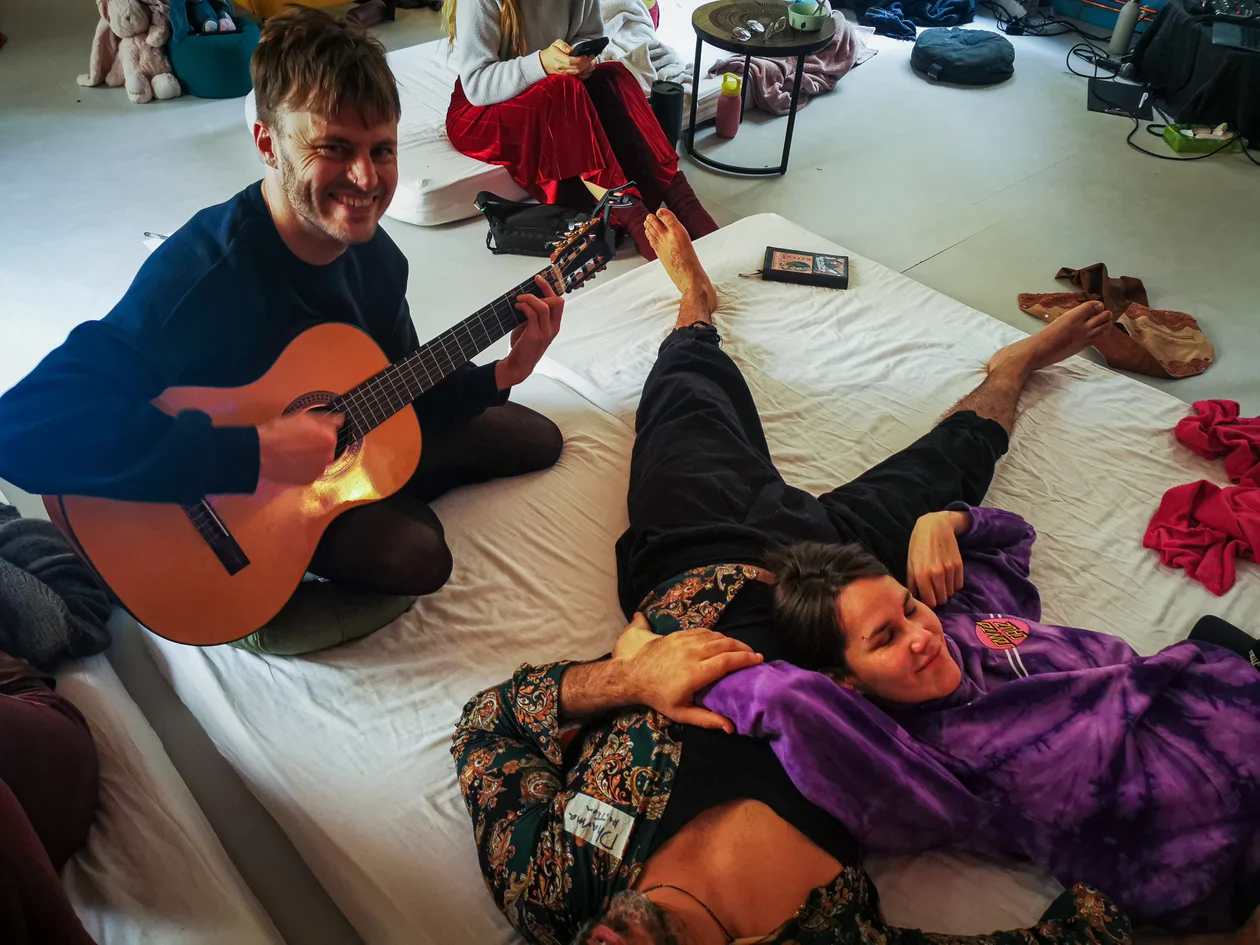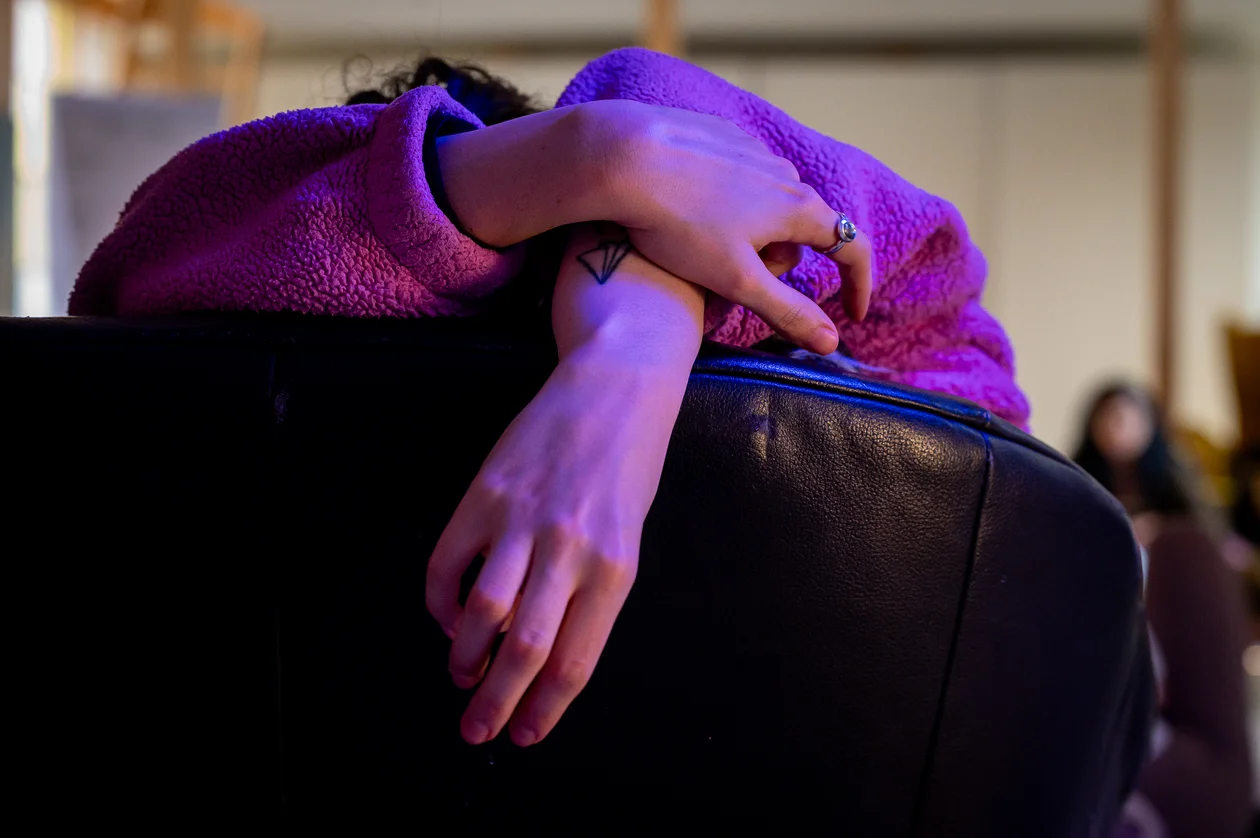Ambassadors For Humanity 2025–2026
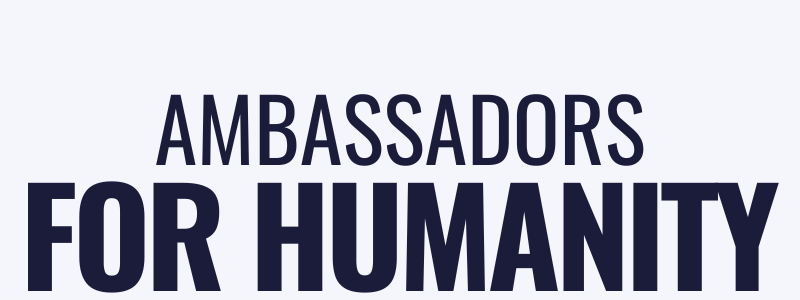

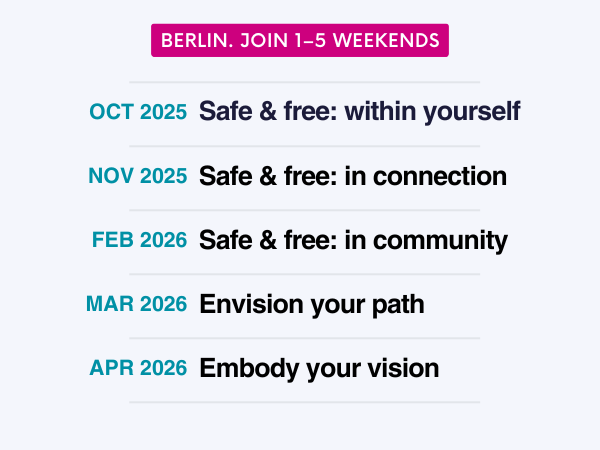
Do you ever Wish you could...
- Connect & express yourself authentically in every part of your life — just like in workshops?
- Take responsibility for shaping your life even when it feels scary or overwhelming?
- Understand your nervous system and grow without pushing yourself?
- Go beyond your individual experience and help shape a world that cares a little more?
- Belong to a supportive community instead of doing it all alone?
“There was a holistic approach to authenticity, engaging, mind, body, and soul. It was a reminder of how I need others, the group and the community, to find new, better ways to relate to myself, others and the world.”
— Elli (Path of Real Moments)
Sounds like you? Here’s what we’ll do
I'm Mette Koppelaar, and with my team we create supportive environments for meaningful learning, experimentation, and play.
Together with Anna and Cosima, I’m excited to offer a program we so deeply care for:
Choose your path Program dates & contents
Join specific weekends
Join an warm, existing community for a weekend or more. Focus on the themes that speak to you. Explore specific experiences and skills around familiar faces: 1–4 weekends + one integration call per weekend.
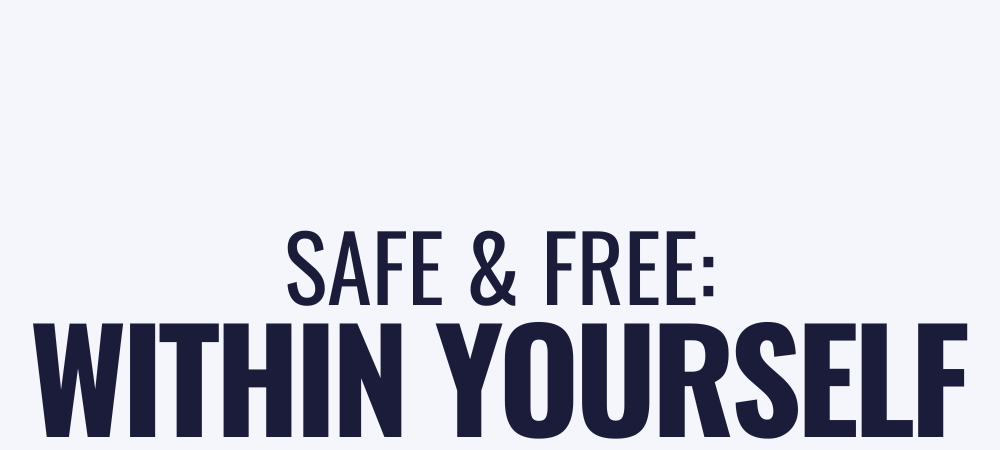

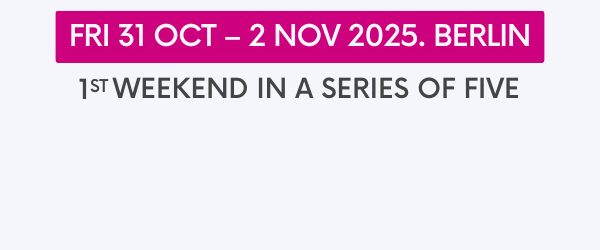
Facilitators: Mette Koppelaar, Anna Schmidbauer, Cosima Siegling
This first weekend lays the foundation for freedom and safety (which is so important, yet often skipped or overlooked): creating inner safety and permission by befriending your nervous system.
You'll learn to:
- Find safety in your nervous system
through tracking & regulating your inner experience. - Create “real moments”
to express yourself more fully. - Live a more authentic life
by integrating these techniques into your everyday.
For more details, watch the video below or check the event page for weekend 1.
Dates & times
- Fri 31 Oct 2025 (18:30 – 22:00)
A nurturing evening, focused on landing, connecting, and starting the weekend. - Sat 1 Nov (10:30 – 22:30)
Daytime practices/experiences to deeply connect with the theme of this weekend. A less structured evening focussed on connection, regulation and/or co-creation. - Sun 2 Nov (10:30 – 17:30)
More practices/experiences to deepen and start integrating the journey in everyday life.
Zoom call
- Tue 11 Nov 2025 (19:30 – 21:30 CET)
Integration call 👩🏼💻
Freedom and safety — what it means in practice
A simple explanation of how your circumstances, past, and inner state shape whether or not you can “be yourself” in any given moment. To understand how you can learn to embrace all of yourself, feel more at home in your body, and more at ease in life, watch the video:
Skip to what interests you:
- 00:00:00 — Introducing the first two weekends
- 00:02:13 — Your personal domain
- 00:04:20 — The Pyramid of Permission
- 00:05:09 — How safety shapes your experience
- 00:08:17 — How permission filters your expression
- 00:09:41 — Real Moments
- 00:10:18 — The “authentic self” myth (and the alternative)
- 00:14:09 — Safe & free within yourself (how to achieve this)
- 00:17:06 — Group conversation
- 00:21:08 — Outro
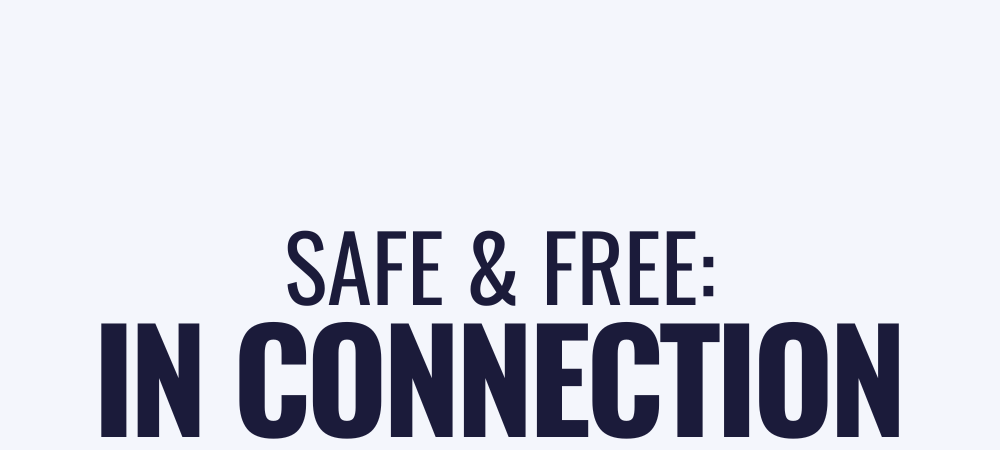

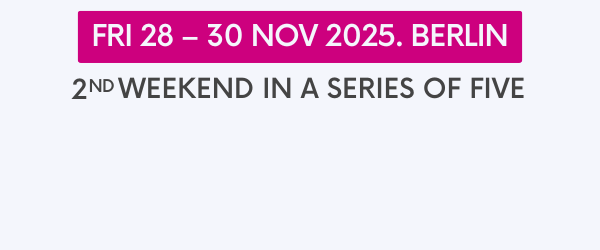
Facilitators: Mette Koppelaar, Anna Schmidbauer
We’ll keep building on the inner safety & permission from weekend 1, while shifting our focus to the dynamics between individual people.
You'll learn to:
- Create relational safety & permission
by setting shared intentions for relationships and interactions. - Reveal your vulnerable parts
and safely share what you’d normally hold back. - Shift from hyper-independence or co-dependence
into a healthy exchange of support (interdependence). - Stay connected to yourself & others
through the ups and downs of life.
For more details, watch the video below or check the event page for weekend 2.
Dates & times
- Fri 28 Nov 2025 (18:30 – 22:00)
A nurturing evening, focused on landing, connecting, and starting the weekend. - Sat 29 Nov (10:30 – 22:30)
Daytime practices/experiences to deeply connect with the theme of this weekend. A less structured evening focussed on connection, co-regulation and/or co-creation. Perhaps an alternative thanksgiving dinner? (Let's decide together!) - Sun 30 Nov (10:30 – 17:30)
More practices/experiences to deepen and start integrating the journey in everyday life.
Zoom calls
- Tue 16 Dec 2025 (19:30 – 21:30 CET)
Integration call 👩🏼💻 - Tue 13 Jan 2026 (19:30 – 21:30 CET)
Community call 👩🏼💻
For full program participants and those joining weekend 2 and 3. - Tue 27 Jan 2026 (19:30 – 21:30 CET)
Community call 👩🏼💻
For full program participants and those joining weekend 2 and 3.
How freedom and safety become relational
How do you create freedom & safety within relationships? How can you use nervous system awareness to avoid drama? How do you create a relationship that welcomes and empowers the individuals and their differences? Watch the video:
Skip to what interests you:
- 00:00:00 — From individual to relational
- 00:00:59 — Cultivating safety & freedom in connection
- 00:07:19 — The drama triangle (meets the nervous system)
- 00:16:12 — Safe states of the nervous system
- 00:18:52 — Empowering relationships
- 00:23:50 — Group conversation & outro
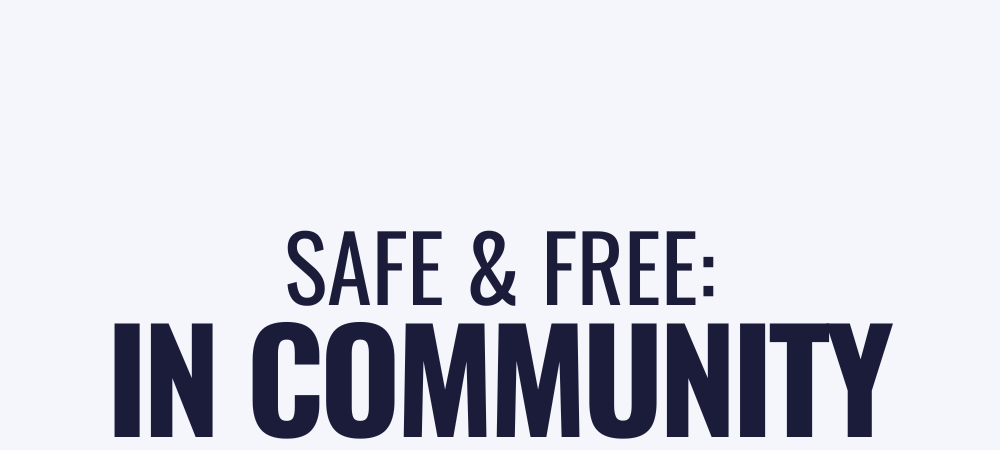

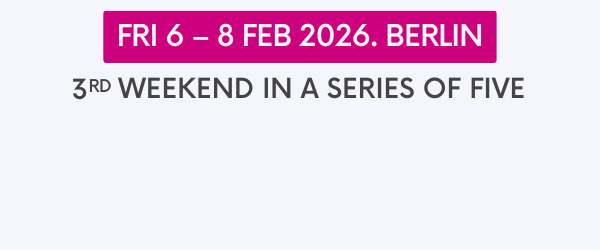
Facilitators: Mette Koppelaar, Cosima Siegling, Anna Schmidbauer
We’ll go beyond the individual/relational perspectives, and explore how safety and freedom show up in groups, communities, and society at large. We’ll bring awareness to how different groups are affected in different ways—and explore what it means to create structural freedom for everyone, rather then conditional freedom for some.
You'll learn to:
- Process pain about the world within community
By expressing our emotions, and witnessing each other’s, we can get ‘unstuck’ and keep moving despite these challenging times. - Create freedom for yourself and others
Learn to express yourself in ways that invite freedom and connection—both for yourself and for others. - Bring nervous system awareness into action
Learn how to pursue your goals and stand for your ideals without burning yourself out. - Foster compassion & curiosity
Loosen fixed beliefs about the “right” way to live or relate—and use curiosity to connect with a broader range of people.
Dates & times
- Fri 6 Feb 2026 (18:30 – 22:00)
A nurturing evening, focused on landing, connecting, and starting the weekend. - Sat 7 Feb (10:30 – 22:30)
Daytime practices/experiences to deeply connect with the theme of this weekend. A less structured evening focussed on connection, regulation and/or co-creation. - Sun 8 Feb (10:30 – 17:30)
More practices/experiences to deepen and start integrating the journey in everyday life.
Zoom call
- Tue 17 Feb 2026 (19:30 – 21:30 CET)
Integration call 👩🏼💻
The times we live in
In these times of war, polarization, systemic oppression, and even Western/democratic governments limiting freedom of speech, everyone can play a role in preserving what makes us human. One side of this is political activism: supporting specific causes or groups. The other side is seeing beyond our differences and staying open to love. Here’s a video where I talk about this in more detail:
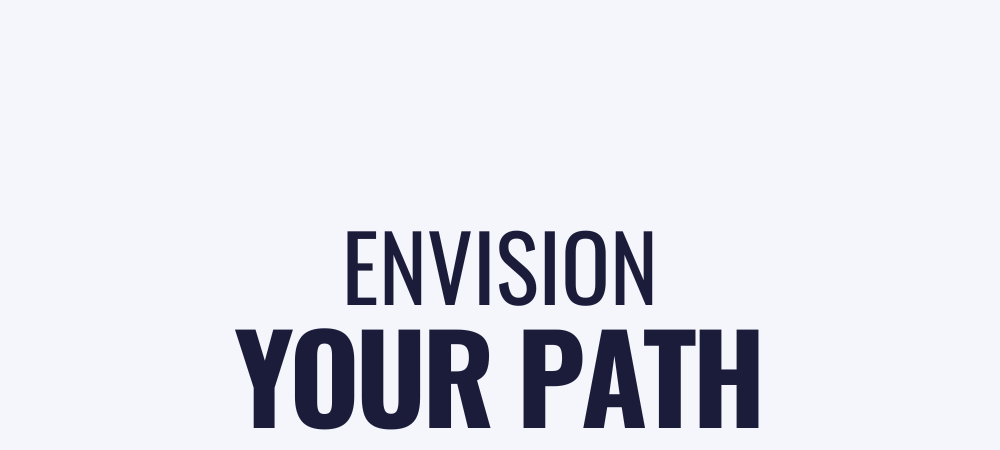

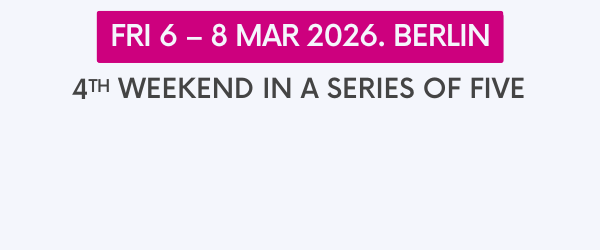
Facilitators: Mette Koppelaar, Anna Schmidbauer
Like every weekends, we’ll keep cultivating safety and permission. From that foundation, we’ll listen deeply: to ourselves, each other, and the kind of life and world each of us long to create.
You'll learn to:
- Experiment
Play, try new ways, take attuned risks, and surprise yourself with new ways of doing things—opening the door to fresh ideas and insights. - Share unpolished ideas
and use the presence of others to discover what truly matters to you. - Own your truth
Take a stand for what’s important to you—build trust that your voice and vision truly matter.
We’re still prepping a dedicated page about this weekend. In the meanwhile, check out the page for weekend 1.
Dates & times
- Fri 6 Mar 2026 (18:30 – 22:00)
A nurturing evening, focused on landing, connecting, and starting the weekend. - Sat 7 Mar (10:30 – 22:30)
Daytime practices/experiences to deeply connect with the theme of this weekend. A less structured evening focussed on connection, regulation and/or co-creation. - Sun 8 Mar (10:30 – 17:30)
More practices/experiences to deepen and start integrating the journey in everyday life.
Zoom call
- Tue 17 Mar 2026 (19:30 – 21:30 CET)
Integration call 👩🏼💻
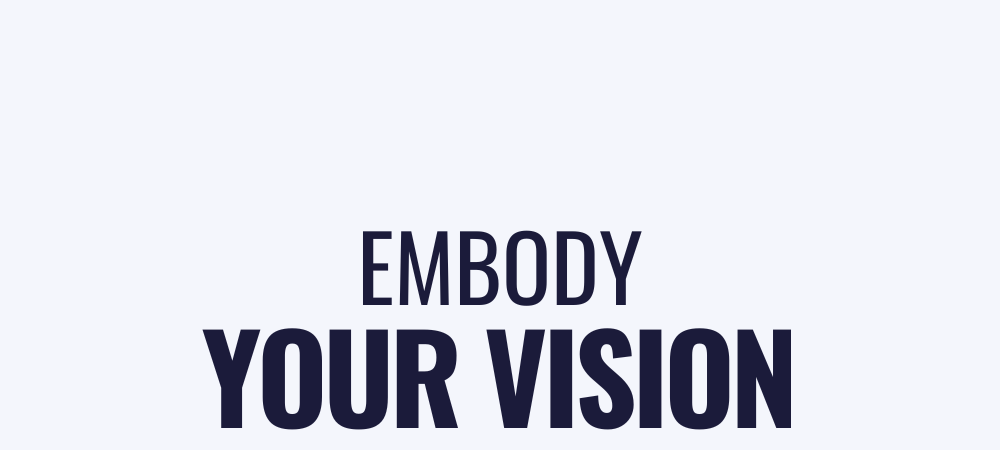

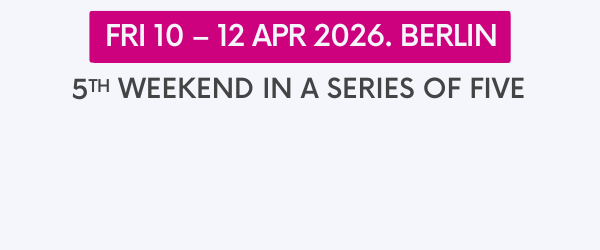
Facilitators: Mette Koppelaar, Cosima Siegling, Anna Schmidbauer
It’s time to bring your vision into the world—not as a stressful or performative act, but through a grounded, intentional process that honors your nervous system’s capacity every step of the way.
You'll learn to:
- Think in learning cycles
Take “right-size” steps that help you grow, adapt, and keep learning as you go. - Lead yourself with self-care
Use self-regulation (journaling, movement, meditation, rest) and co-regulation (touch, conversation, receiving support) to stay resourced—so you can take initiative sustainably. - Co-create with others
Alone may go fast, but together you’ll go far. Practice building and acting collaboratively—and find out what community and ongoing support can look like in your everyday life.
We’re still prepping a dedicated page about this weekend. In the meanwhile, check out the page for weekend 1.
Dates & times
- Fri 10 Apr 2026 (18:30 – 22:00)
A nurturing evening, focused on landing, connecting, and starting the weekend. - Sat 11 Apr (10:30 – 22:30)
Daytime practices/experiences to deeply connect with the theme of this weekend. A less structured evening focussed on connection, regulation and/or co-creation. - Sun 12 Apr (10:30 – 17:30)
More practices/experiences to deepen and start integrating the journey in everyday life.
Zoom call
- Tue 28 Apr 2026 (19:30 – 21:30 CET)
Final integration call 👩🏼💻
The Pyramid of Permission
The model and philosophy that forms the foundation for the program:
Skip to what interests you:
- 00:00:00 — Three levels of humanity
- 00:02:42 — Real Moments
- 00:04:15 — Creating real moments
- 00:06:42 — Safety and permission
- 00:09:00 — The full model
- 00:10:20 — Creating positive imprints
- 00:12:36 — Supportive environments
- 00:14:50 — Confidence, skill & sensitivity
- 00:18:22 — 5 weekends, 5 perspectives
- 00:24:36 — Group conversation
Weekend 1: Freedom and safety — what it means in practice
A simple explanation of how your circumstances, past, and inner state shape whether or not you can “be yourself” in any given moment. To understand how you can learn to embrace all of yourself, feel more at home in your body, and more at ease in life, watch the video:
Skip to what interests you:
- 00:00:00 — Introducing the first two weekends
- 00:02:13 — Your personal domain
- 00:04:20 — The Pyramid of Permission
- 00:05:09 — How safety shapes your experience
- 00:08:17 — How permission filters your expression
- 00:09:41 — Real Moments
- 00:10:18 — The “authentic self” myth (and the alternative)
- 00:14:09 — Safe & free within yourself (how to achieve this)
- 00:17:06 — Group conversation
- 00:21:08 — Outro
Weekend 2: How freedom and safety become relational
How do you create freedom & safety within relationships? How can you use nervous system awareness to avoid drama? How do you create a relationship that welcomes and empowers the individuals and their differences? Watch the video:
Skip to what interests you:
- 00:00:00 — From individual to relational
- 00:00:59 — Cultivating safety & freedom in connection
- 00:07:19 — The drama triangle (meets the nervous system)
- 00:16:12 — Safe states of the nervous system
- 00:18:52 — Empowering relationships
- 00:23:50 — Group conversation & outro
Weekend 3: The times we live in
In these times of war, polarization, systemic oppression, and even Western/democratic governments limiting freedom of speech, everyone can play a role in preserving what makes us human. One side of this is political activism: supporting specific causes or groups. The other side is seeing beyond our differences and staying open to love. Here’s a video where I talk about this in more detail:
“Organized by a very caring team of wonderful people, the sessions felt very balanced: theory parts enriched with very personal examples and exercises to actually experiment with it myself.”
— Sarah (Path of Real Moments)
When, where, quanto costa? The practicals
The weekends happen at the beautiful KARA Kulturraum in Berlin. We start Friday at 18:30 and wrap up by 17:30 on Sunday. It’s possible to stay over and soak up the group energy all weekend.
Times
With 20+ contact hours, each weekend allows for a slow start, a soft landing, and many meaningful experiences in between:
- Friday (18:30 – 22:00)
A nurturing evening, focused on landing, connecting, and starting the weekend. - Saturday (10:30 – 22:30)
Daytime practices/experiences to deeply connect with the theme of this weekend. A less structured evening focussed on connection, regulation and/or co-creation. - Sunday (10:30 – 17:30)
More practices/experiences to deepen and start integrating the journey in everyday life.
Weekend dates
- 31 Oct – 2 Nov 2025
Safe & free within yourself
Program weekend 1 - 28–30 Nov 2025
Safe & free in connection
Program weekend 2 - 6–8 Feb 2026
Safe & free in community
Program weekend 3 - 6–8 Mar 2026
Envision your path
Program weekend 4 - 10–12 Apr 2026
Embody your vision
Program weekend 5
See if it fits
Add the dates to your calendar (downloads a .ics file)
Zoom calls
- Tue 11 Nov 2025 (19:30 – 21:30 CET)
Weekend 1 integration call 👩🏼💻 - Tue 16 Dec 2025 (19:30 – 21:30 CET)
Weekend 2 integration call 👩🏼💻 - Tue 13 Jan 2026 (same time)
Community call 👩🏼💻
For full program participants and those joining weekend 2 and 3. - Tue 27 Jan 2026 (same time)
Community call 👩🏼💻
For full program participants and those joining weekend 2 and 3. - Tue 17 Feb 2026 (19:30 – 21:30 CET)
Weekend 3 integration call 👩🏼💻 - Tue 17 Mar 2026 (19:30 – 21:30 CET)
Weekend 4 integration call 👩🏼💻 - Tue 28 Apr 2026 (19:30 – 21:30 CET)
Weekend 5 integration call 👩🏼💻
Online community: the Telegram group
A resource that can be used for things like:
- Sunday sharing circle: Possibility to share life updates every Sunday.
- Emotional/practical support: Learn to ask for what you need and support each other.
- Co-creation: Birthing ideas and initiatives together.
- Connect with the team: Ask questions in between weekends.
- Anything else: Host a movie night, ask for feedback or advice, find an accountability partner, or offer your skills and wisdom.
The group will lose its official status after the program, but can continue to exists for those who want it.

Practical:
- Group size: 10–20 lovely humans
- Availability: Spots are filling up. Join us
- Language: English
- Preparation: When you join, you’ll receive a free copy of part 1 of Mette’s book, which you're invited to read.
- Bring: comfortable, layered clothing, pen&paper, a water bottle, a meditation pillow (if it’s not too much hassle), snacks for in between meals—and whatever brings you comfort or joy. Bring one item that represents safety and one that represents permission, so we can make an altar for each. Bring snacks to share, and lunch/dinner if you don’t want to eat out or order.
Venue, food, staying over:
- Venue: KARA Kulturraum, Berlin (google maps). It's a beautiful, queer, collaborative art space in Berlin Moabit. Photos and accessibility description below.
- Accommodation: It’s possible (and fully optional) to stay at the house on Friday and Saturday night. For €20 per night, you’ll receive a mattress, pillow, duvet, pillow cover, & duvet cover. Please bring a bedsheet. You’ll either stay in the workshop space or in another shared space. Limited availability.
- Food: You can bring your own food or go to one of the nearby restaurants during the breaks. Some people will typically eat together. (There is a fridge+freezer and kitchen at the venue for light meal preparation.)
- Accessibility: There is a ramp and extra bell that can be reached without climbing stairs at the entry. The house has no thresholds. There is an accessible bathroom and shower. The garden can be reached via the garden gate. The only non-accessible parts of the house are the two mezzanines that allow for extra space. There's a parking space available right in front of the door in the backyard. Please get in touch if you require any assistance.
- Pets: You can't bring your super cute doggie. I'm sorry.
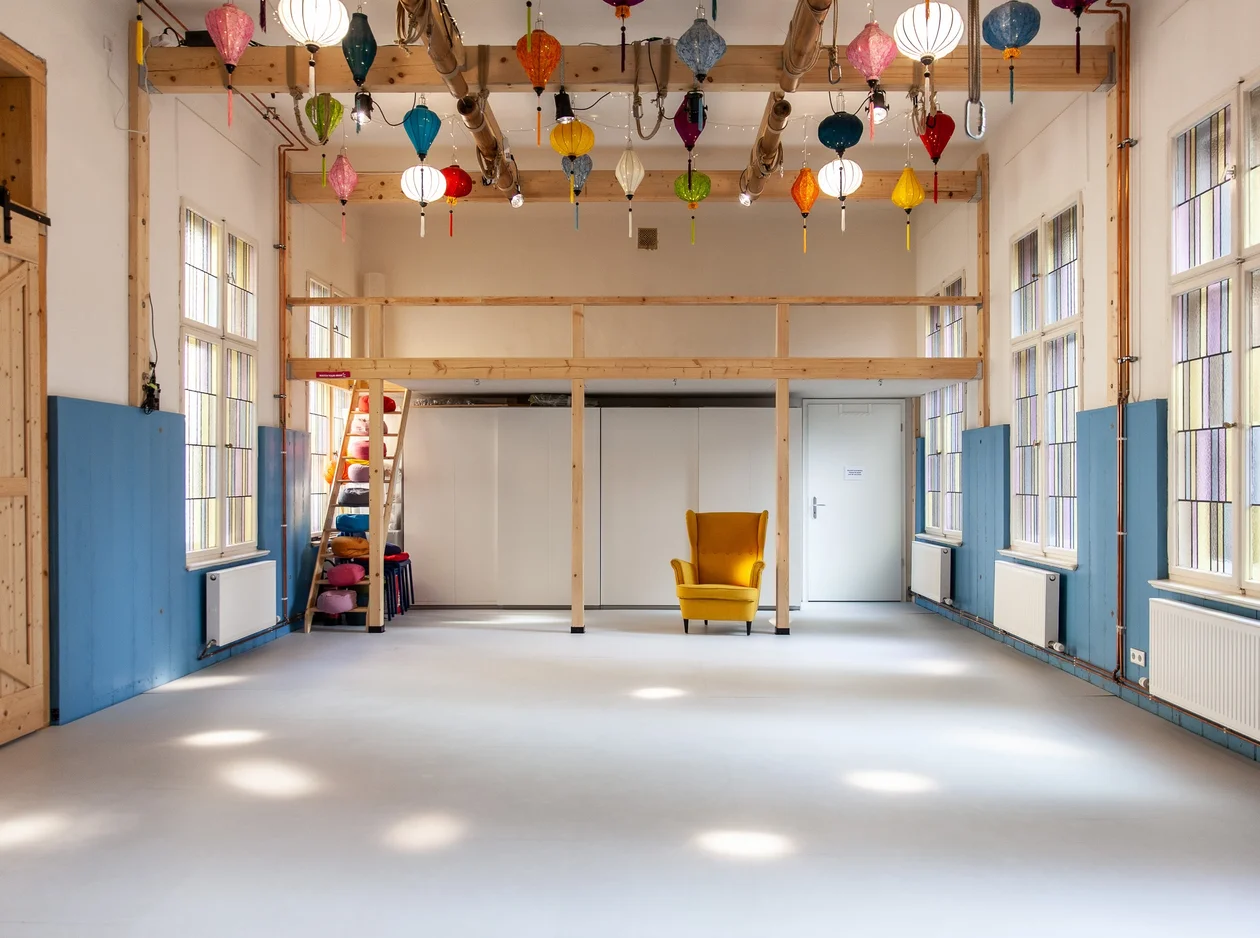
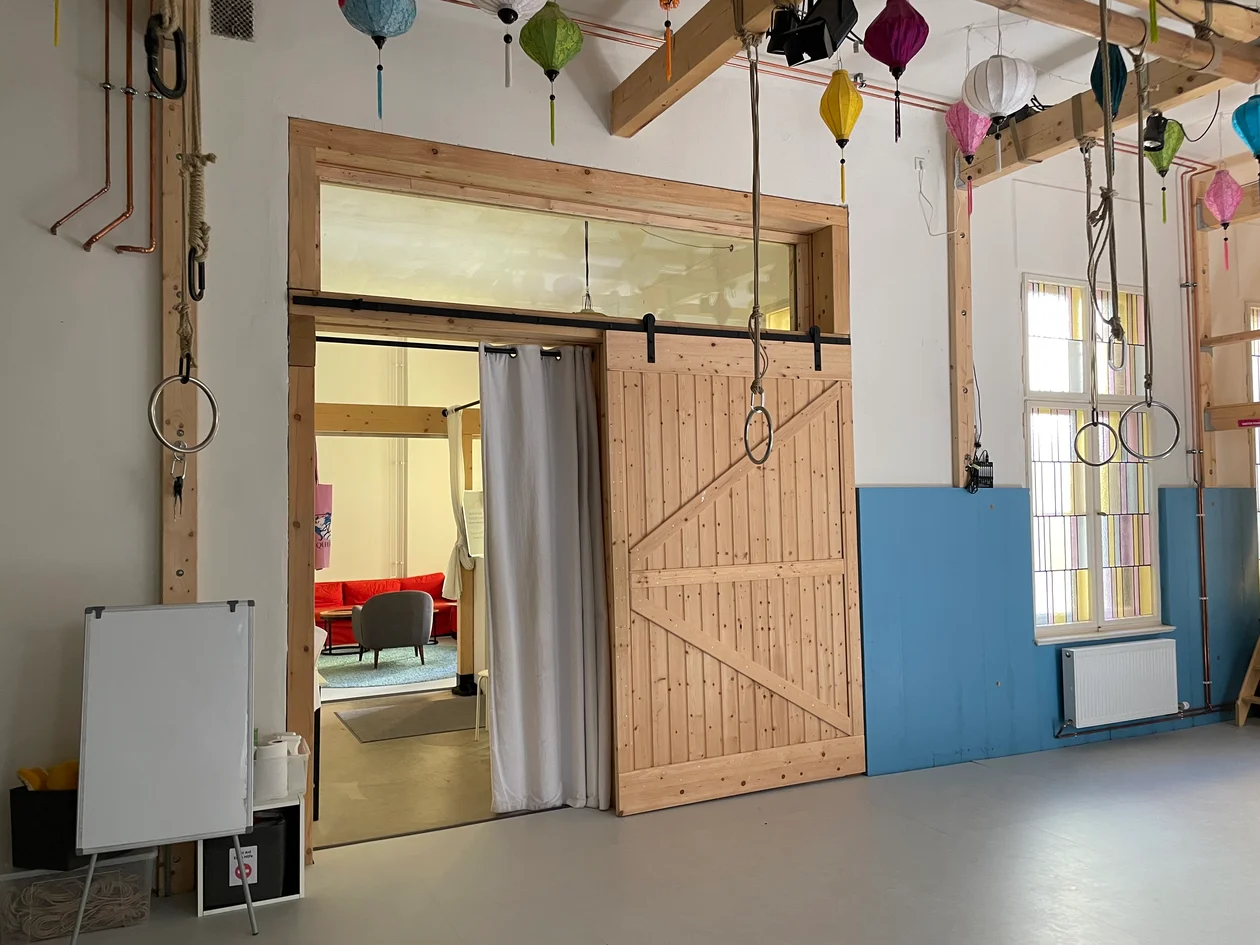
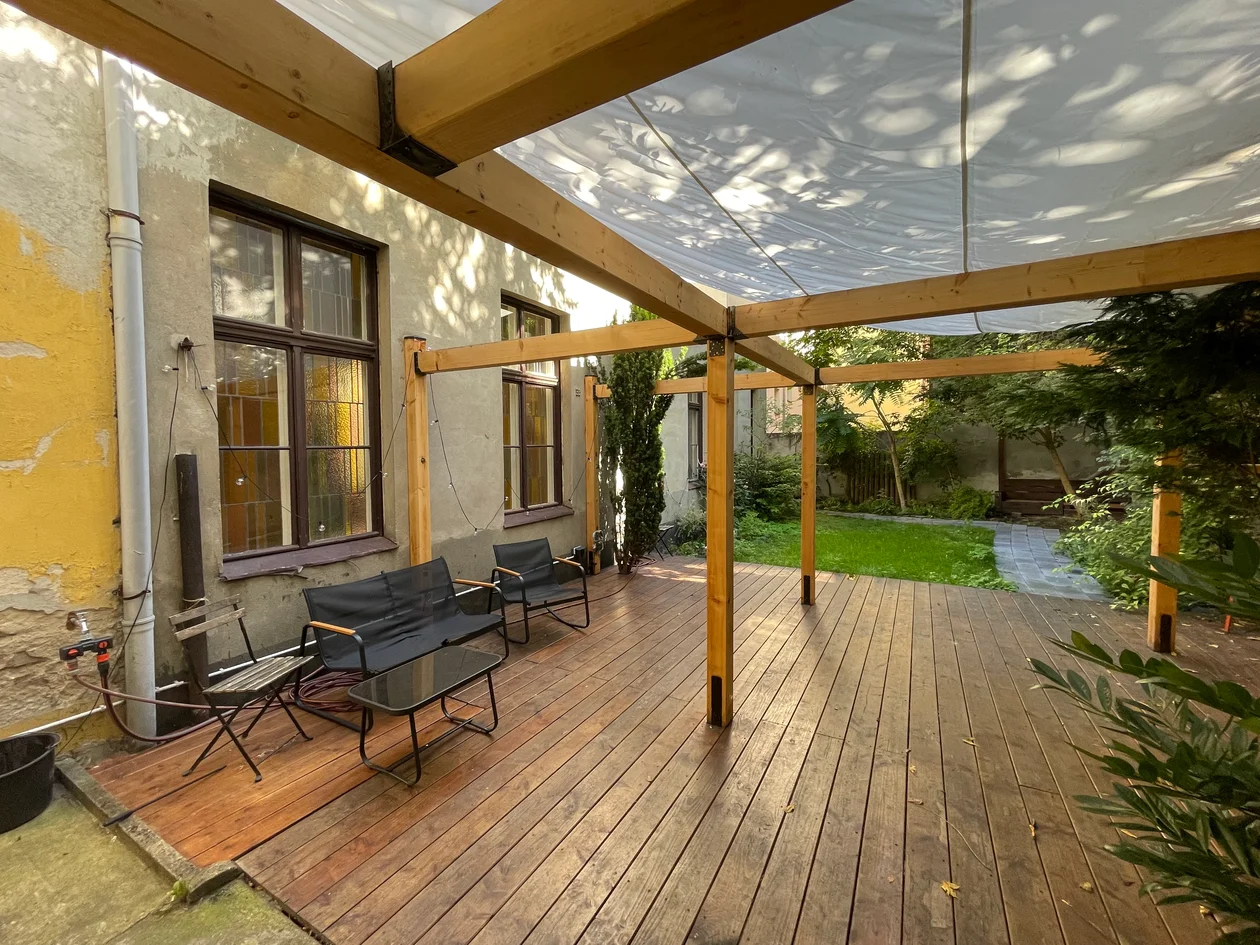
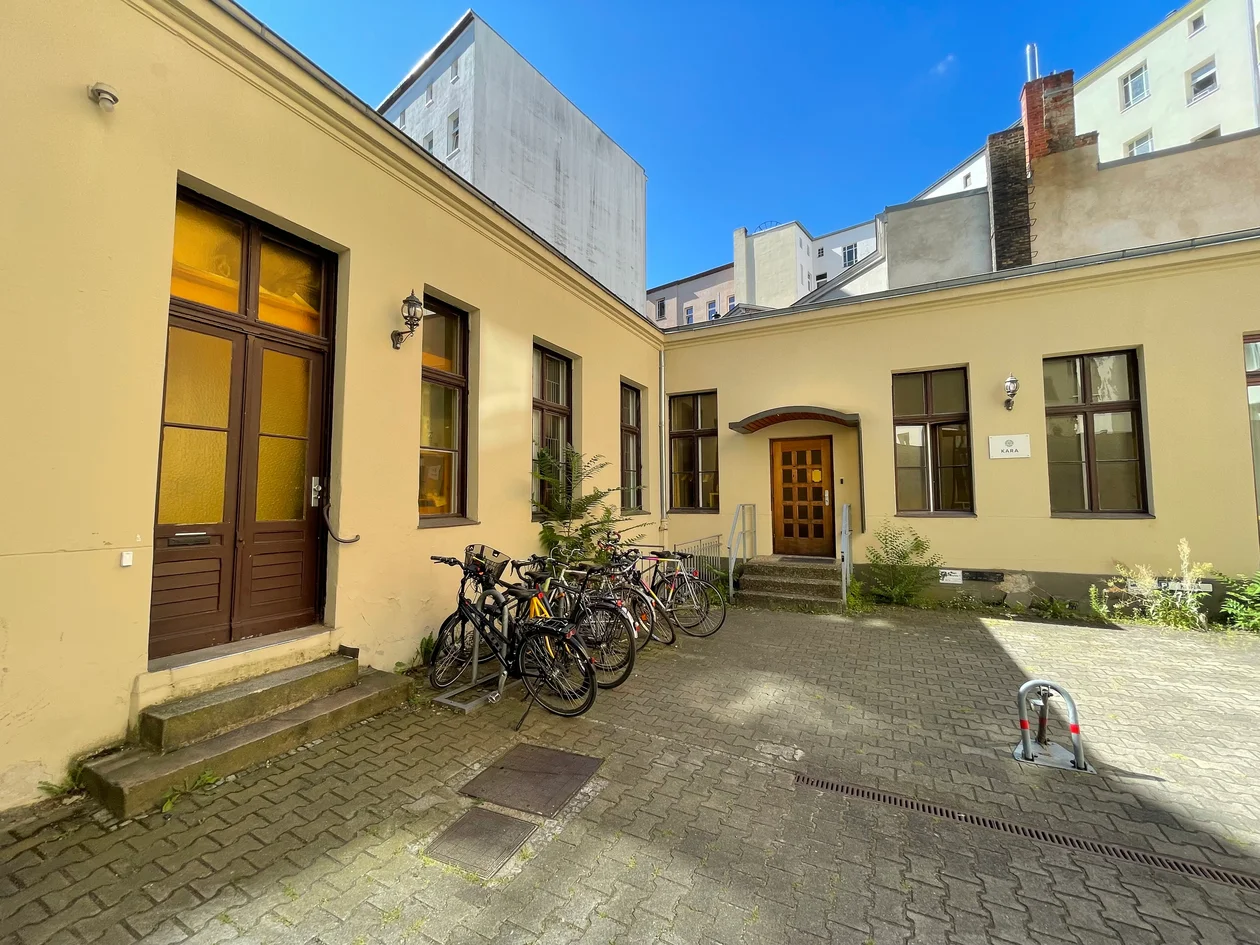
Can you picture yourself here?
Sign up or book a free discovery call with Mette.
Price per weekend when joining 1–4 weekends:
- €290 — minimum price when joining 3+ weekends
- €305 — minimum price when joining 2 weekends
- €325 — minimum price when joining 1 weekend
- €690 — join 1 weekend for the fully sustainable price (or choose any number in between)
- €244 – €310 — thanks to an incredibly generous donation, I can offer 5–25% discount to a few people joining weekend 3, or people joining more than one weekend.
- €145 – €250 — helper price per weekend (includes 19% VAT)
Prices for the full program
- €1.450 — when money is tight
- €1.850 — when you can pay some more
- €2.250 — when you’re financially comfortable
- €3.450 — when you can afford the fully sustainable price
- €725 – €925 — helper price for the full program (includes 19% VAT)
What you’ll get
Before your first weekend:
- A 45-minute intake call with Mette
Each weekend includes:
- 20+ contact hours in person
- A two-hour follow-up call on Zoom
- Early access to part 1 of Mette’s book.
- Ongoing support and connection in the Telegram Group
- A committed group of peers who prioritize growth and connection.
Pay in installments
It's possible to pay in installments. This brings more risk and administration on my side, so it costs a little more:
- Pay in 2 installments: 1.5% fee
- Pay in 3 installments: 3% fee
- Pay in 6 installments: 6% fee
Make your choice
You can indicate your price preference as you sign up.
Priority for helper spots and scholarships is given to those facing challenging situations or with marginalized identities.
Unsure what to do? Book a call call or message me on Telegram.
“Mette has a special power to create spaces where everyone can feel welcome and safe to explore who they are. I truly believe that if more people would participate in spaces like these, we can change the world we want to live in.”
— Nora (Path of Real Moments)
Who’s creating this? Meet the facilitators
We’re four people from different walks of life—united in our wish to contribute to a world where all people can flourish and grow.
We strive to hold these weekends in a responsible, trauma-informed way, but also show up as the humans we are, and are genuinely open to connect — whether through genuine conversation, hugs, or dances; laughter, tears, or play.
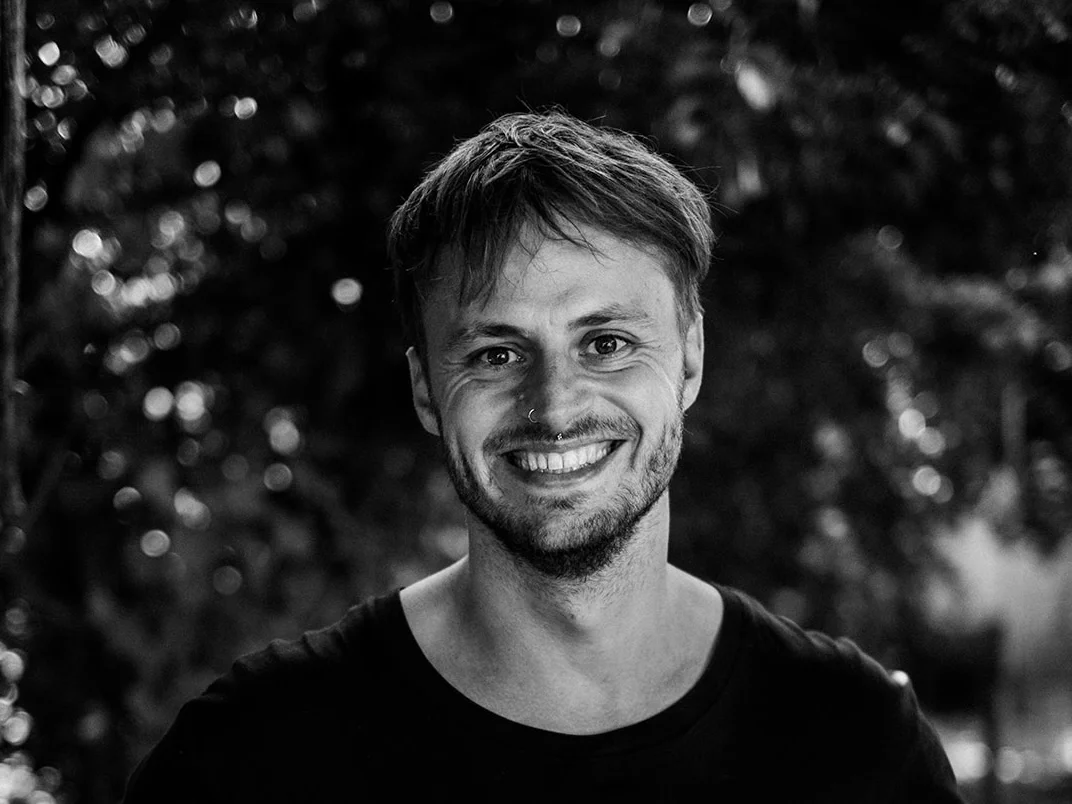
Mette Koppelaar (1984, they/them)
Facilitates weekends: 1 / 2 / 3 / 4 / 5
I see authentic self-expression as a way to welcome more of myself, build deeper connection, and contribute to a more loving world.
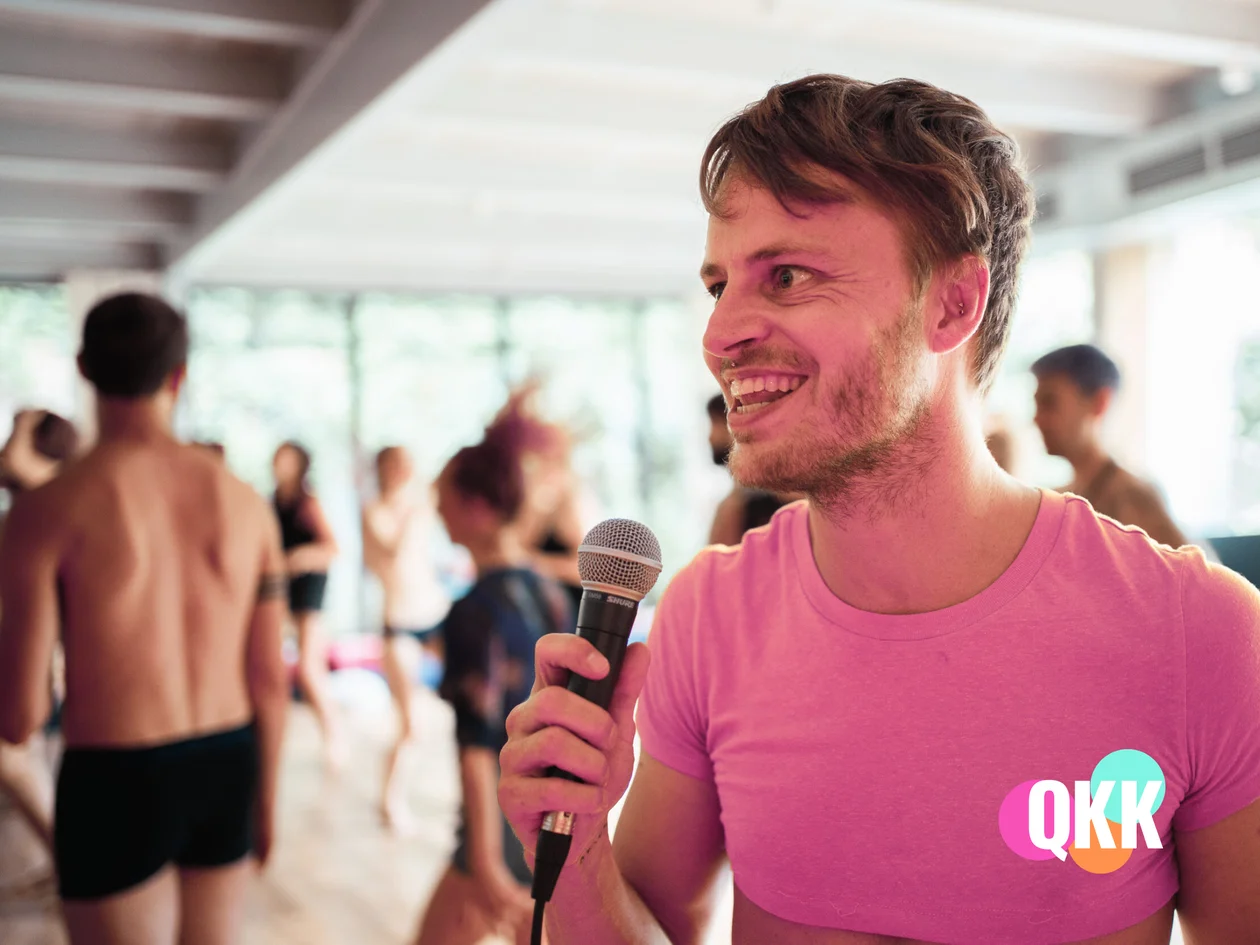
As a facilitator, I create spaces where people from diverse identities can be true to themselves, build trust, and contribute to a culture of freedom and care. I use frameworks like:
- The Pyramid of Permission (developed by me)
- Polyvagal Theory
- Internal Family Systems
- Wheel of Consent
- Nonviolent Communication
- Diamond Approach
- Buddhism
My approach is simple: when there’s enough outer safety and permission to express yourself, you’ll meet the edges of your inner safety and permission. Having positive experiences at your edges, you can slowly become more comfortable with a wider range of expression. Over time, this allows you to reveal more of yourself in more areas of life.
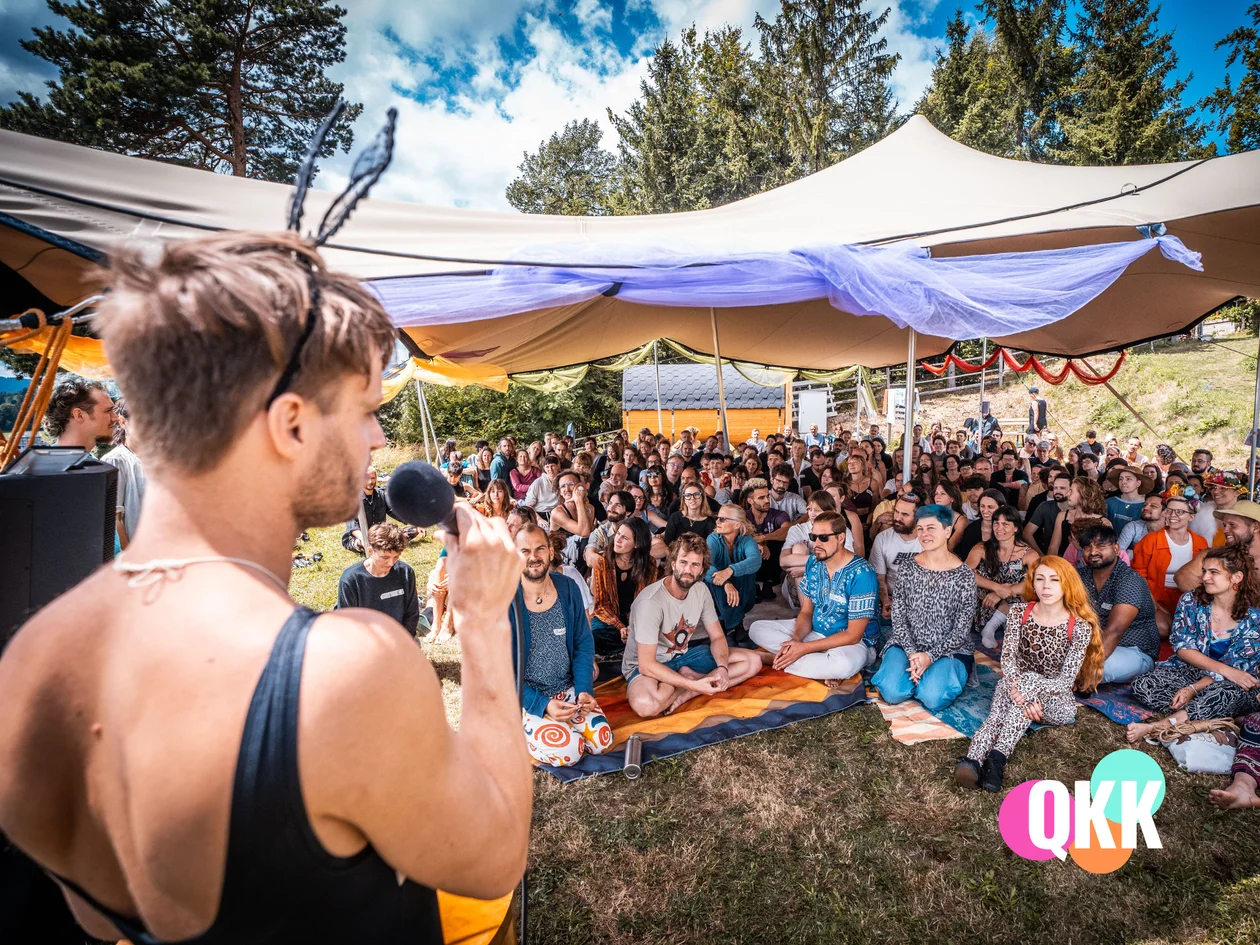
My lens and ambition
I was born in Amsterdam in 1984. I’m white, able-bodied, middle-class, and gender nonconforming, using they/them or he/him pronouns. I grew up with safety and stability, with parents who spent years in group therapy before I was born. I haven’t faced war or poverty, and my passport allows me to travel freely—privileges I’m increasingly aware of.
At the same time, dressing outside gender norms has shown me what it’s like to not always feel safe on the street. Research, book interviews, and many personal conversations have deepened my understanding of societal oppression—especially for those whose identities are most targeted.
What began as a search for personal freedom has turned into a deep longing for a free, just, and equal world. It’s what I strive to contribute to in my work and daily life—one real moment at a time.
Connect with me
Book a free call, join my mailing list, Telegram channel, or Instagram — or watch some of the videos below this photo:
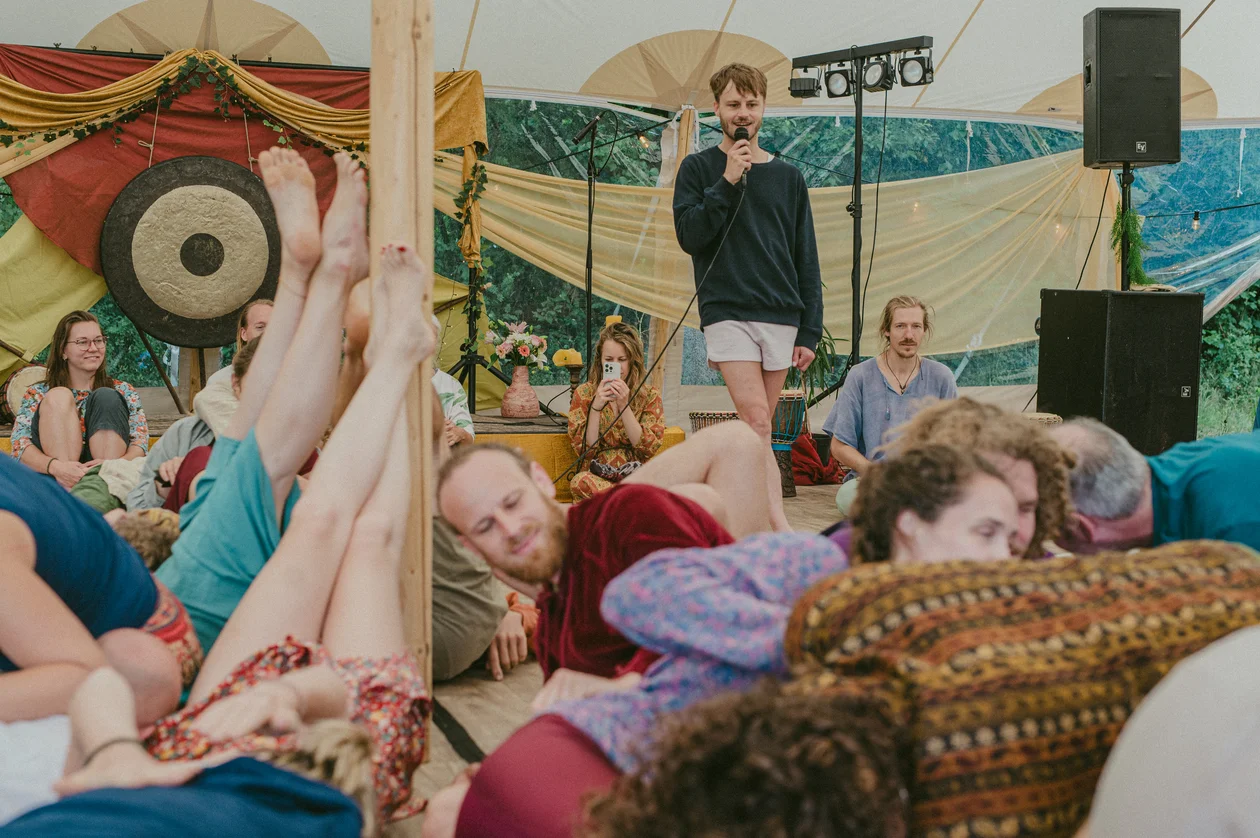
Watch me talk
Why I created Ambassadors For Humanity:
How dressing outside the norm led me to do this work:
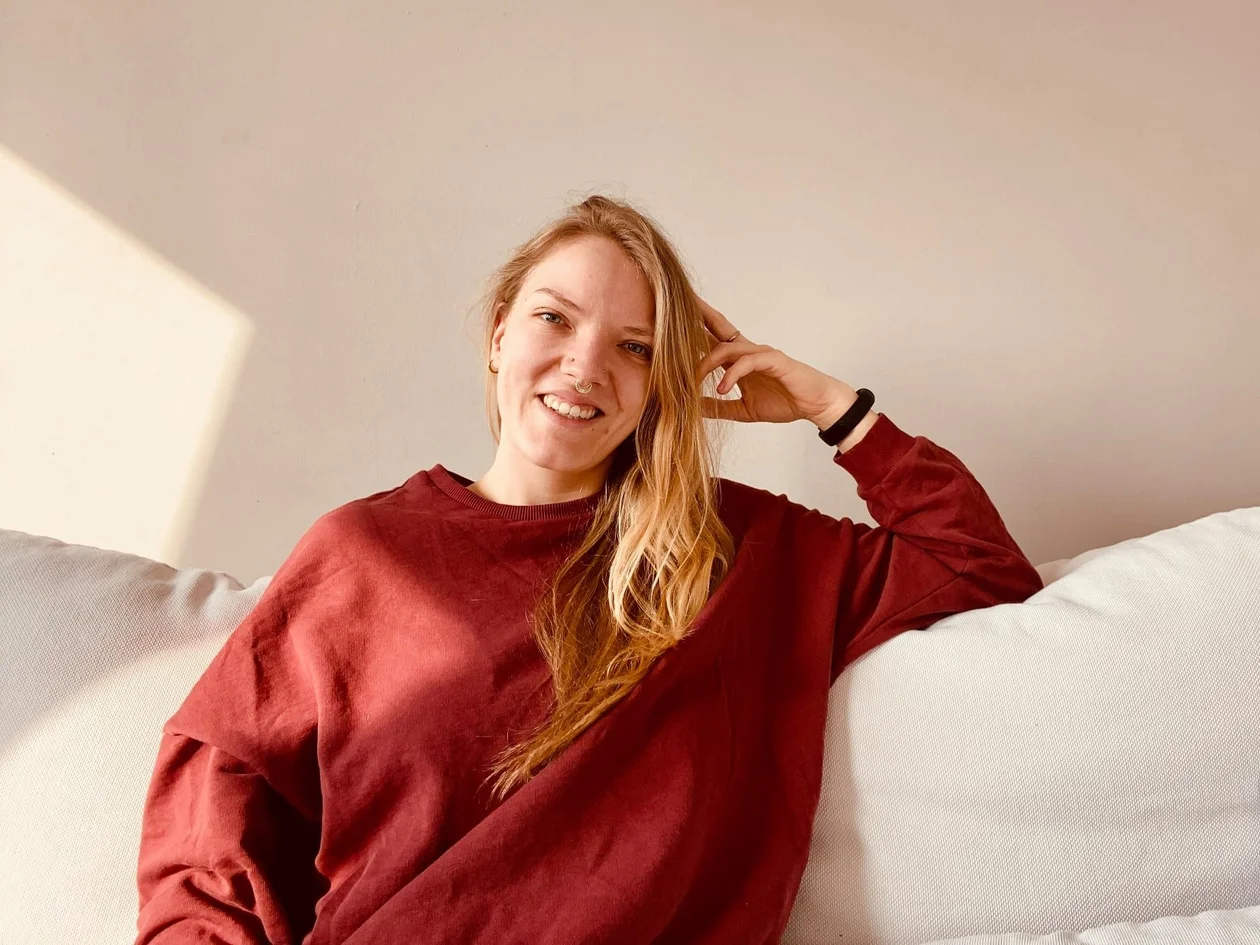
Cosima Siegling (1996, she/her)
Co-facilitates weekends: 1 / 3 / 5
“I’m deeply engaged with questions of human connection—between people and in relation to the environment. Over the past decade, I’ve focused on creating spaces for political education, community building, and meaningful connection. In this, I bring a strong commitment to consent, clear communication, and space for nuance.
I hold a B.A. in Philosophy and Communication Science and an M.Sc. in Human Ecology, where I explored ethical and structural questions of the human‐environment relationship. Combined with years of designing group processes and learning environments, this gives me a solid toolkit to work with the intersections between individual, cultural, and structural dynamics.
My personal lens is shaped by both privilege and challenge. I’m a white, able-bodied, middle-class woman, born very premature but able to grow into health thanks to modern medicine. I grew up in a conservative Catholic village in southern Germany, later stepping exploring a more secular view. As a pansexual and polyamorous girl/woman, leaving the place I grew up in meant a lot of freedom and space to explore who I am and how I love. At the same time, I was confronted early on (and still am today) with mental illness in my family. At the same time, I experienced a strong foundation of love and support, and had the privilege of accessing therapy at a young age. These contrasts ground my awareness of how both hardship and resources shape our ability to grow, integrate, love and flourish.
A particular focus of mine has been facilitating sex-positive, experiential, and educational spaces — approaching touch, bodies, sexuality, and relationships in an embodied and emancipatory way. Having lived in polyamorous constellations for almost ten years, it’s close to my heart to support people in deconstructing and reimagining their own concepts of love, intimacy, partnership, and sexuality.
I’m truly excited to be part of Ambassadors for Humanity and to share this journey with you.”
Cosima introduces herself
Watch Cosima introducing herself during the Zoom call when this program was not much more than a broad idea:
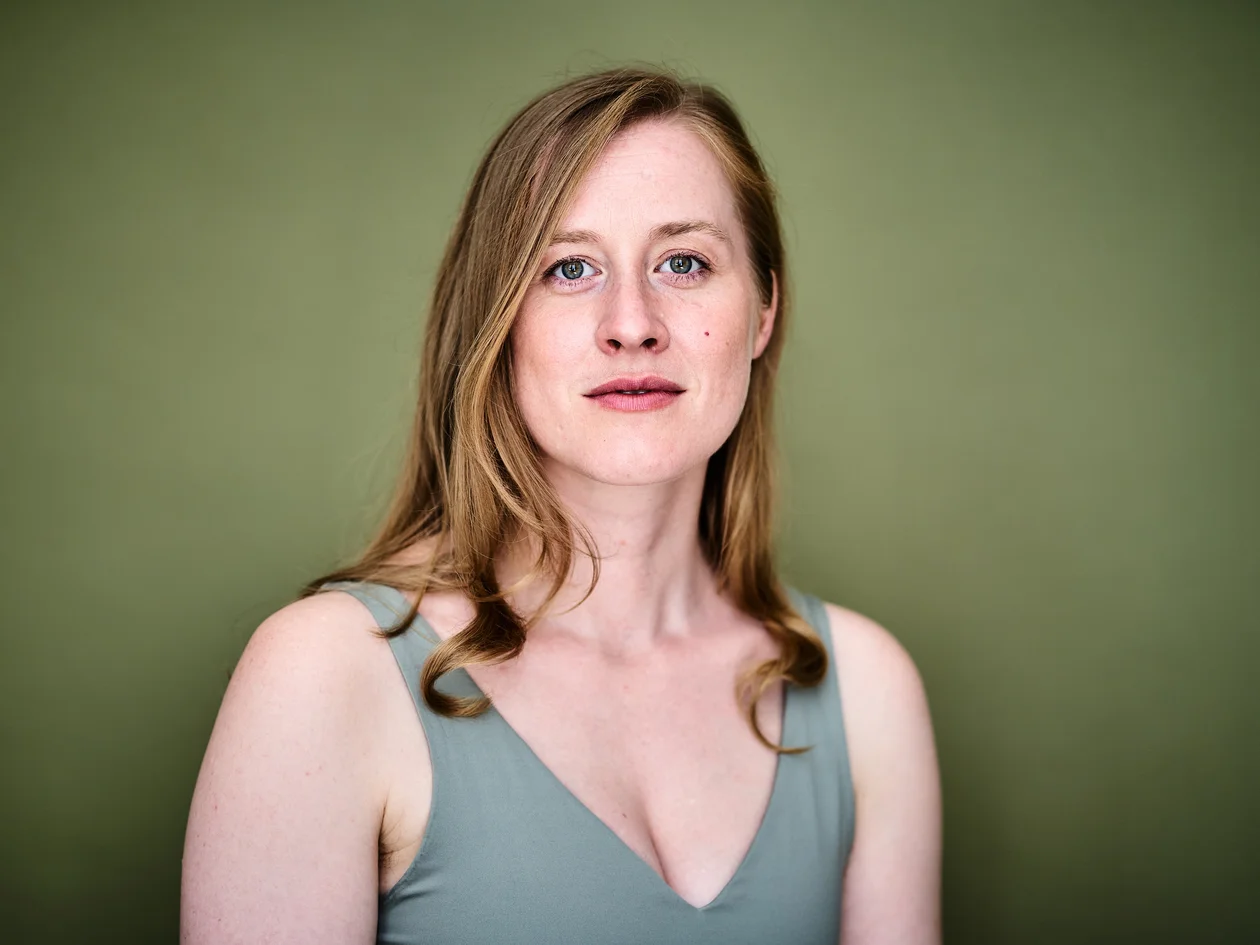
Anna Schmidbauer (1989, she/her)
Co-facilitates weekends: 1 / 2 / 3 / 4 / 5
“With my earliest professional roots in social work, I have dedicated 15 years of my life to working with children and teenagers. Learning and deepening most of my current work ethics through and with them, I have offered creative conflict resolution camps out in the wilderness, democracy camps, Czech-German youth exchanges as well as early childhood rhythmic education. I have worked in juvenile detention as well as in Waldorf kindergarten. This wide range of fields has informed and shaped me deeply.
Later, when I started a new professional chapter with being trained in the Pantarei Approach, I realized that the aspects which fascinated me most about the work with children, were also the key elements that unlocked fertile and fruitful processes in the somatic coaching processes of my clients.
Believing in the power of our heartfelt visions and dreams, I am now supporting entrepreneurs who wish their work to be a holistic, just and sustainable contribution and possible solution to some of today’s pressing issues. One of my main goals in this work is to support my clients and their bodies in offering what is most meaningful to them, without setting themselves up for burnout.
I believe in the courageous act of unlocking innocence, play, expression, fascination, excitement, honesty and hope - qualities I have seen and immersed myself in in their purest form in my work with children. When those qualities are allowed to be part of our healing work, of much needed activism and new work models, there’s the potential to experience them beyond the real risk of them being ‘fluffy love and light’ escape strategies.
I’m grateful and joyful to be part of the upcoming Ambassadors for Humanity journey, and look forward to us researching and weaving together.”
“Mette and their team created a container in which I felt safe to explore and also safe not to. I appreciate the way in which they draw tools from different approaches, and offer them unobtrusively for everyone to pick what is helpful for them.”
— Mia (Path of Real Moments)
You’re so welcome to Spend some time with us
Spots are filling up:
You’re so welcome to join us ❤
- Join 1–4 weekends:
Open the signup form - What it costs:
Price overview - Unsure?
Book a discovery call (with Mette)
If you can, please sign up early — it gives you time to prepare (mentally) and tells us who to expect.
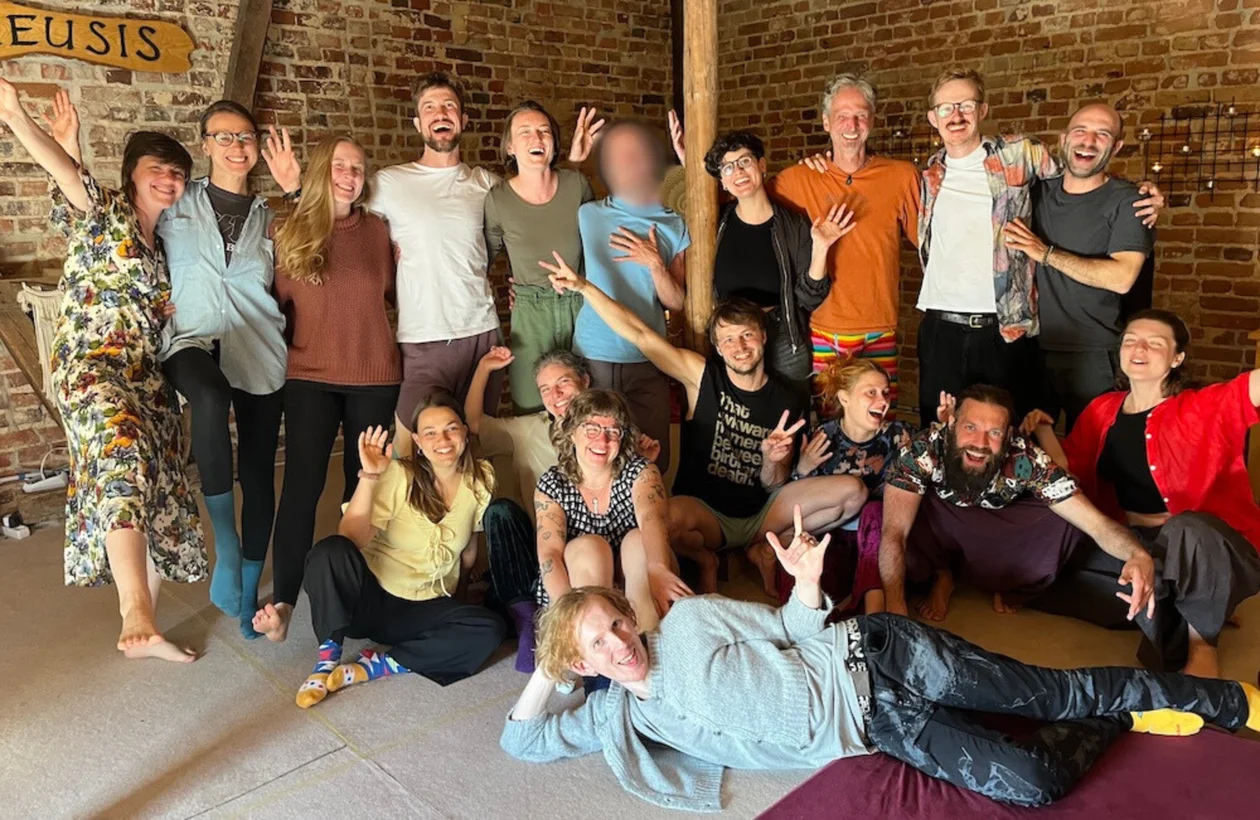
“It’s really not that cold!”
– some annoying person who jumped in the water before you
Many people spiral back and forth between yes and no. But not all spirals are the same. Here are two types of doubts people tell me about:
1. Actual life concerns:
- “I have wayyyyy too many things going on. Adding something will send me straight into a burnout.”
- “I know it’s not the right time, but I fear this is my last chance! ”
- “I'm really low on cash, and spending more money will affect my ability to pay rent or buy food.”
If this is you, then now is probably not the best time to join. (Maybe read about nervous system regulation through shaking on my Telegram.)
2. Fear of doing something new:
- “Part of me is excited! But I’m also a little afraid”
- “I have little experience in these spaces — and I fear I’ll be the only one.”
- “I don’t yet know anyone there — and I fear I’ll feel awkward or alone.”
If this is you, it’s what I call “normal” fear or resistance. So, at the risk of sounding persuasive, here’s my take on it:
- You won’t be the only inexperienced one. Most participants don’t yet know each other. Rather, we all start to form a deep bond over the course of experience. That’s the beauty!
- Many people have these kinds of fears — especially the first time. In fact, it’s almost prerequisite for joining because it shows you’re on your edge of growth.
- Sometimes, it’s helpful to stop overthinking, remember that you can always leave, and take a leap of faith. Often, the annoying person turned out to be right: the water really isn’t that cold.
Break the spiral by having a chat with me on Zoom. In 15-20 minutes, you’ll likely find more clarity than after days of thinking about it. We can talk about the retreat, a specific challenge in your life, or simply make small-talk and have a laugh.
Check out all my events, follow me on Telegram, Instagram, or Facebook. Or join the mailing list:
“Looking back at the impact this journey continues to have on my life, I'm full of love, appreciation, and gratitude for the team and every participant who made this so special and beautiful.”
— Kéan K. (Path of Real Moments)
Yes, we take this seriously: Values & accountability
How we take responsibility for the space:
The following values are the foundation for all my work. If these don't resonate with you, then we may not be a match. Of course, these values are always a work in progress. If something about them doesn’t feel right, or if you have ideas for improvement, I would love to hear from you. Message me on Telegram or through the contact form.
If it ever feels like I or any of the team members don't live up to these values, I would love for you to tell me.
- Authenticity: Everyone's invited to verbally, physically, and emotionally express themselves. We can play with our expression without justifying ourselves, yet we strive to do so in a way that’s considerate of other people.
- Inclusivity: We welcome all identities and personal backgrounds. We try to notice the judgments and assumptions we make about others, and question racism, sexism, ageism, ableism, homophobia, transphobia, or other discriminatory beliefs or behavior.
- Consent: We respect each other's space, stuff, boundaries and privacy. We share a responsibility to create a safe environment for ourselves as well as for others.
- Confidentiality: We don’t share about other people’s experiences. We don’t comment on other people’s experiences without their consent.
- Self and group responsibility: We’re try to look after our own well-being and ask for help when we need it—even when we don't know what we need. We try to be aware how we take up space, and strive to contribute to the safety of the group.
- No sex or romance with team members: Team members don't share arousal, sexual energy, or romance with participants. (We might like to share hugs or other forms of touch though!)
- No intoxication: We don't consume drugs and alcohol during or before the event, and limit the use of phones/devices in public spaces.
Lots of beautiful things can happen in spaces like these. You may also encounter interactions that don’t work for you—even when everyone has the best intentions. This can often be repaired when everyone involved is willing to have a vulnerable conversation about what happened.
If you have an unpleasant experience with a team member or fellow participant, I encourage you to reach out to them directly. If that doesn’t work or feels like too much, you’re very welcome to contact me (Mette) via Telegram or the contact form, or to contact any other team member. I/we may be able to support you and won’t take any action without your consent.
If you have an unpleasant experience with me (Mette), you're invited to reach out to me directly, contact another team member, or approach my accountability partner Anouk Bongers. She won't communicate with me unless you consent to it. You can find her contact details here.
If you’re still carying something that happened a long time ago, I want to acknowledge that it can take time to process certain experiences. Sometimes months or years. The offer above remains valid. There’s no such thing as reaching out too late.
(To see the actual prices, click here)
Working independently in a sustainable way comes with many invisible costs. Because event prices in this field are sometimes perceived as high or ‘commercial’, I want to be transparent about how they are calculated — and how different price levels work out for me.
Please don't let this overview stop you from joining or from requesting a price that’s workable for you (and make sure to check the actual prices) All I ask is that you understand what each price point translates to on my side.
| The fully sustainable price per weekend (incl. VAT) | €690 |
| If I let go of... | The price is... |
| Nothing | €690 |
| Attending trainings & events to improve & promote my work | €624 |
| Taking vacation | €558 |
| Taking time off on public holidays | €531 |
| Taking time off when I'm sick | €505 |
| Being insured for when I truly can't work | €478 |
| Saving up for business challenges | €409 |
| Saving up for my pension | €271 |
| Adding to my personal savings | €202 |
I will still choose to take time off when I’m sick and take vacation. Not having the full income means that when I do these things, I have to take that money from savings or pension.
I don’t expect everyone to pay the full price
Most people won’t — and that’s OK.
I just want to make visible that when someone pays less, the difference has to come from somewhere. For example: if twenty people each ask for €75 discount, that means I'll either need to find a donor or take €1.500 out of my savings/pension.
Some reflective questions you can consider:
- Do you have a job, savings, financial support, a family you can rely on, or time to make some money on the side?
- Do you have stable housing, citizenship, and good health? Do you frequently encounter systemic oppression or discrimination?
- Can you afford to spend time and money on eating out, events, yoga, vacation — or does most of your money go into housing, food, and health?
- How many people depend on you financially — such as children, sick family members, or family abroad?
- Knowing what this program can contribute to your life, is there truly no way to source the money? Or would you simply prefer not to put in that effort?
The actual calculation:
If you’d like to understand the prices in more detail, here’s a description of the calculation:
- I aim to work 5 days a week, 8 hours a day. Out of those hours, roughly 40% of my time goes into things like admin, general promotion, and other general tasks. This means I have around 24 hours per workweek to make my income.
- On a yearly basis, I have to account for vacation, sick days, public holidays, festivals where I work for free to make a name for myself, and the time I spend on training that lets me do this work in a responsible, trauma-informed way. Which leaves me with around 38 work weeks per year.
- This means I have to make my entire annual income in 24 x 38 = 912 hours per year, or 76 hours per month.
- I spend at least 460 hours on one edition of this program:
- 145+ hours of preparation: developing the program; promotion; venue communication; setting up a team; handling signups and cancellations; chasing payments; communicating with participants, helpers, team members, and the venue; shopping; and many more small tasks.
- 275+ hours for preparing and facilitating the actual five weekends
- 40+ hours for preparing and hosting the online calls
- Besides the time investment, I spend money on overhead costs for my business, renting the venue, paying team members, and buying materials I need for running the program. Depending on how signups are going, I might have to spend money on online promotion, printing flyers, etc.
- Now, to earn the median salary for someone my age (41) in this part of the world, I have to generate a shocking €104 for each hour that I work on this program (excluding VAT). To achieve this, I would need to have 20 signups for an average of €3.450 per participant, or €690 per weekend (including VAT).
- To make this program more inclusive, I've lowered my salary to less than a third of the median, which greatly reduces the price, which means I rely on additional donations to make it work. It also means that for everyone paying less, there needs to be someone paying more.
- While this enables more people to come to the event, the impact on me is that I have a very low salary and very little security: I basically cut out all of my safety nets. I don't save money, I don't save up for a pension, and I don't have disability insurance. This works as long as I'm healthy, have access to cheap housing, and don't have kids or anyone else to care for. But it offers very little security—now and later in life—and I would be properly screwed whenever I have any medical challenges.
So yes — it's complex...
Thank you for reading all this. If you want to share your reflections—or make a financial donation to support me in offering this work at a price that others can afford—you can message me on Telegram or through the contact form.
Or click here to see the pricing options.
Conditions for canceling your ticket
If your spot is taken by someone you found or someone on the waiting list:
- 100% refund minus €75 admin fee
If no one takes your spot:
- Cancel up to 2 months before we start: 100% refund minus €75
- Cancel up to 1 month before we start: 50% refund
- Cancel up to 2 weeks before we start: 20% refund
- Cancel in the 13 days before we start: no refund
A few things to keep in mind:
- The waiting list only opens once the event is sold out.
- I consider your spot taken when when (a) you found someone to take your spot and they mention your name their application form or (b) the program is full, the spots of any people who cancelled before you have been taken first, and someone on the remaining waiting list takes your spot.
- I'll refund you once the new person has paid in full.
- You can't transfer your spot to someone else without my approval.
- If you haven't paid the full amount and no one has taken your spot, you're obliged to pay all remaining installments—even if you cancelled.
Conditions when I cancel the event:
- 100% refund
Most of the workshop photos were taken by Mio Schweiger. The portraits, group photos, and space photos were taken by others.
You scrolled a loooong way. Now, choose wisely:
- Ready to join? Signing up takes just a few minutes
- Have specific questions? Schedule a free intake call with Mette
- Want to stay in the loop? Follow me on Telegram, Instagram or Facebook

